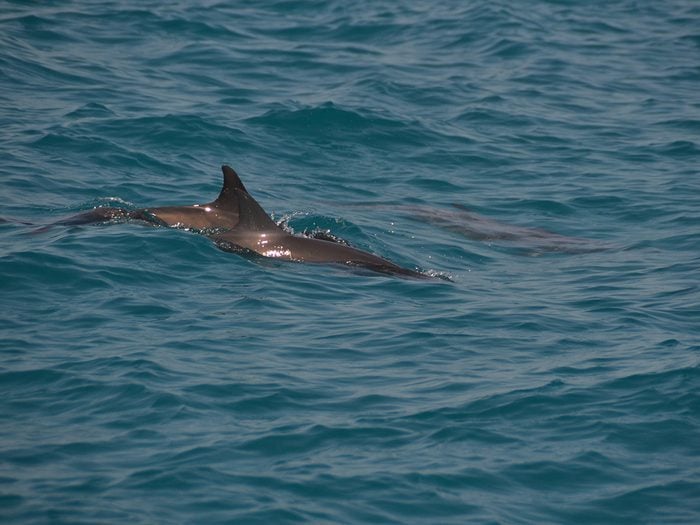
Community Rallies to Rescue Dolphin Pod
Linda Groocock was out running errands in Digby, Nova Scotia, last November when she spotted an unusual sight off the coast: 16 Atlantic white-sided dolphins had become beached. Figuring they didn’t have a lot of time—dolphins can survive out of water for only about six hours—Groocock quickly got in touch with the Halifax-based Marine Animal Response Society (MARS), as well as some friends who individually contacted the local fisheries department and posted about the dolphins on a community Facebook page.
MARS personnel were too far away to get to the dolphins in time, so they enlisted Digby’s volunteer fire department to help coordinate the response. Soon, about 40 locals who had seen the news online arrived on the scene and waded into the mud flats. Then they carefully moved the dolphins to tarps or sleds and gently hauled them back to the water. It wasn’t long before each dolphin was safely back in the sea, swimming with its podmates. —Patricia Karounos
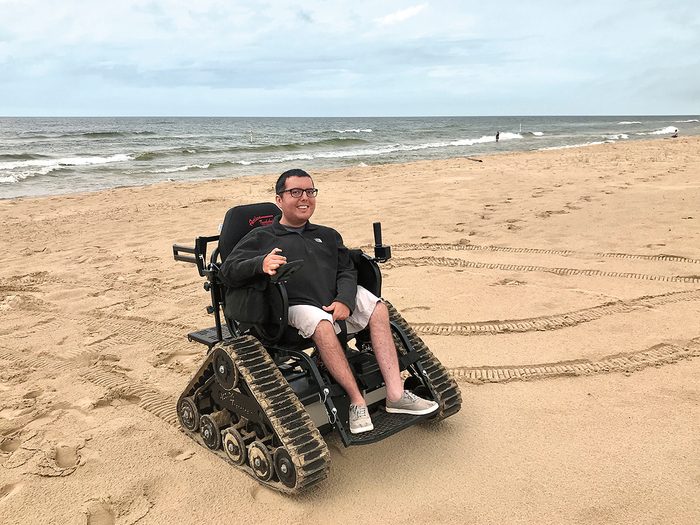
Have Chair, Will Travel
For 33-year-old American travel blogger Cory Lee, it used to be easier to explore Antarctica than some of the nearby parks and beaches in his home state of Georgia. Using a wheelchair once meant that rugged hiking trails were off-limits, but that’s no longer the case. All-terrain power wheelchairs are now available at state parks in Georgia, as well as in Colorado and Michigan. The wheels and treads on each Action Trackchair allow people with mobility issues to traverse rocky trails, sandy beaches and uneven terrain. They’re even powerful enough to make steep uphill climbs. As Lee told CNN, “It’ll open up a whole new world for me and for other wheelchair users.”
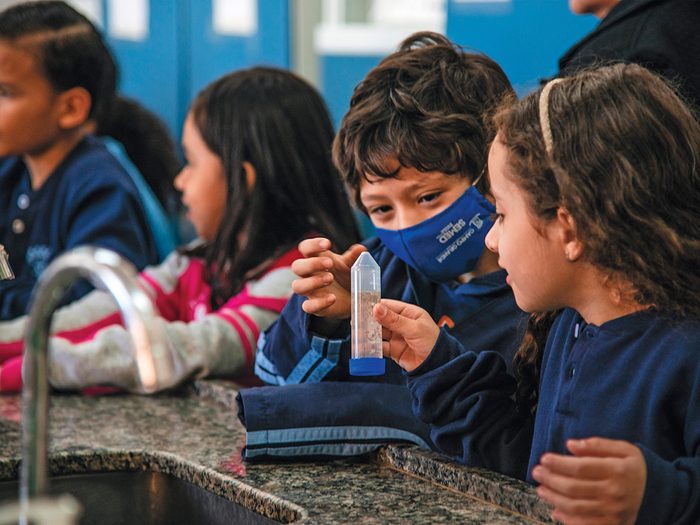
Fighting Mosquito-Borne Diseases
With its densely populated communities, Brazil struggles with outbreaks of mosquito-borne diseases like Zika virus, chikungunya and dengue fever. The World Mosquito Program (WMP) hopes to change that by using the Wolbachia method—and it’s enlisting school kids to help.
Wolbachia is a type of harmless bacteria found in up to half of insect species and research has shown it helps reduce disease transmission. The project raises mosquitoes with Wolbachia and then releases them into communities, where they mate and produce offspring carrying the bacteria.
In 2022, the WMP’s Brazil chapter teamed up with 17 public schools in the central-western city of Campo Grande. About 1,600 students were provided with kits to raise an estimated 2.5 million Wolbachia mosquitoes over 16 weeks. The children also learned about proper mosquito safety.
“It isn’t the whole solution,” says Luciano Andrade Moreira, who leads WMP operations in Brazil. “Along with vaccines and insecticides, Wolbachia mosquitoes are one more tool.”
The program is showing results elsewhere in the world. For example, a study in Yogyakarta, Indonesia, found a 77 percent reduction in dengue cases in Wolbachia-treated regions. —Patricia Karounos
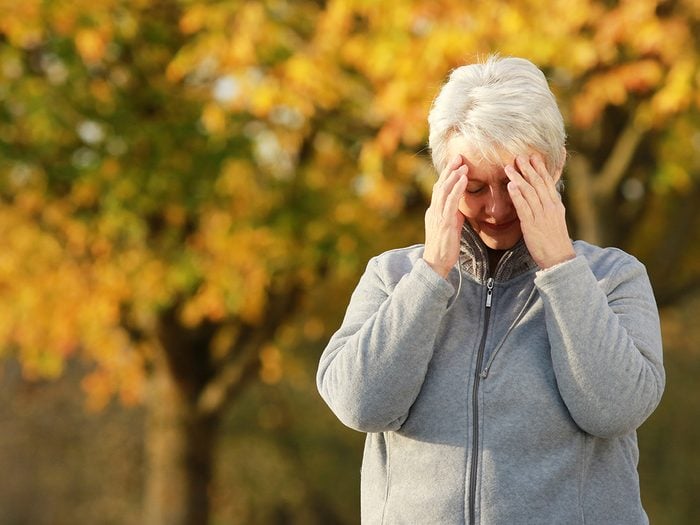
Bracelet Keeps People With Dementia Safe
Project Lifesaver, founded in the U.S. state of Virginia in 1999, is a non-profit organization that helps find wandering individuals, such as those with dementia or other cognitive conditions. Participants wear frequency-emitting wristbands—a technology often more reliable than GPS.
Earlier this year, the program made its 4,000th rescue, quickly finding a seven-year-old boy with autism who had wandered away from his Indiana home during the winter.
Today, there are more than 1,700 Project Lifesaver-certified agencies in the U.S. and Canada that can locate wanderers in an average of 30 minutes. —Patricia Karounos
Learn how to spot the early signs of dementia.

Bringing a Nation’s Trees Back to Life
Although Iraq was once the world’s leading producer of dates, years of war and drought resulted in the destruction of half of the country’s roughly 30 million date-palm trees.
Labeeb Kashif Al-Gitta, co-founder of agri-tech company Nakhla, is working to revive the iconic tree. For an annual subscription, Nakhla tends to residents’ mature trees, so they can hopefully bear fruit once again.
Nakhla launched in 2018, and as of 2022 the company cared for more than 14,000 date palms, with hopes to reach 50,000 by the end of 2023. —Patricia Karounos
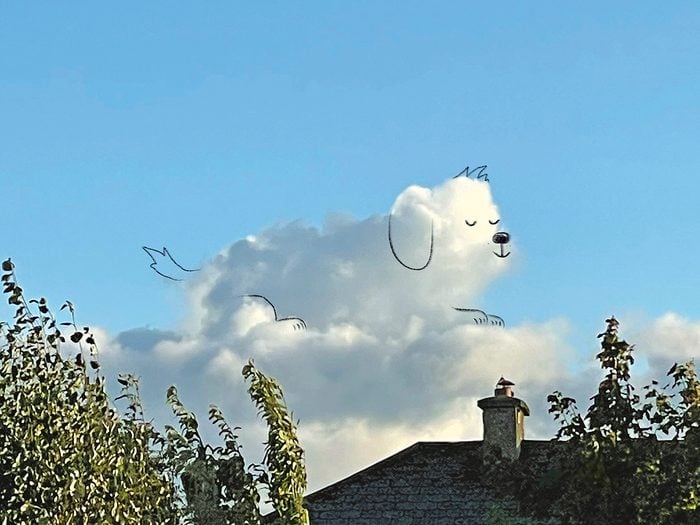
Cloud Characters
On a cloudy day, most people see just that—clouds. But Dublin-based artist Chris Judge has seen a bear, a dog and much more. In 2020, Judge began sharing his cloud art on his Instagram account, A Daily Cloud. Using an app, he draws lines around the edges of clouds, transforming them into whimsical characters he now shares with more than 429,000 followers. “There are certain times in the day when the sun hits the clouds and makes them look huge and three-dimensional,” he told People. “And after a rainstorm, clouds always seem to look incredible.” Judge also accepts fan submissions—encouraging others to look up, lest they miss out on something amazing.
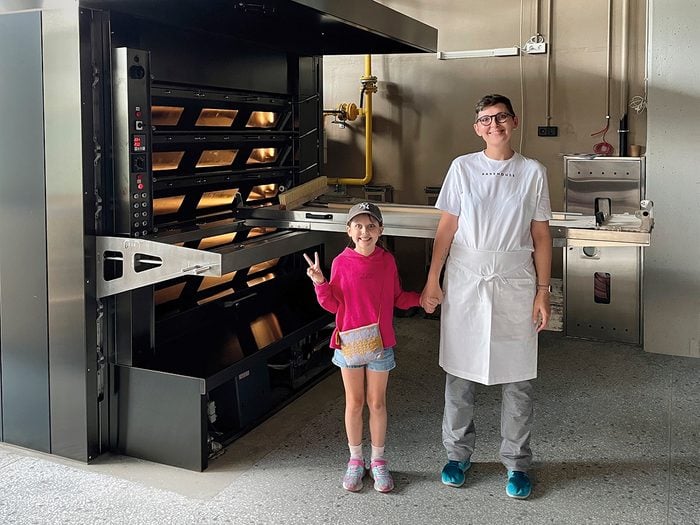
Baking in a War Zone
Despite suffering sieges, massacres and displacement because of the Russian invasion, Ukrainians have defied expectations and put up a strong fight. The same can be said for the hard-working team at Bakehouse in Kyiv.
When war first broke out, the bakery’s chef and owner, Anna Makievska, left the country with her two young children. Her employees, however, refused to close shop. Not only are the people behind Bakehouse still operating the business, but they have been giving away up to 1,000 loaves of bread every day since the beginning of the conflict to soldiers, seniors and hospital workers.
Their kindness has inspired others: When English sourdough-bread baker Andrew Green heard about Bakehouse’s story, he enlisted other chefs to donate recipes for a charity cookbook, Knead Peace. Proceeds from the project go to the Disasters Emergency Committee’s Ukraine Humanitarian Appeal.
Though she’s currently based in Portugal to be near family members, Makievska is still helping keep Bakehouse running. For the team, these loaves are more than just food; they are something good being created in the face of war and suffering. “And we will continue to bake them for as long as our country needs them,” says Makievska. —Robert Liwanag
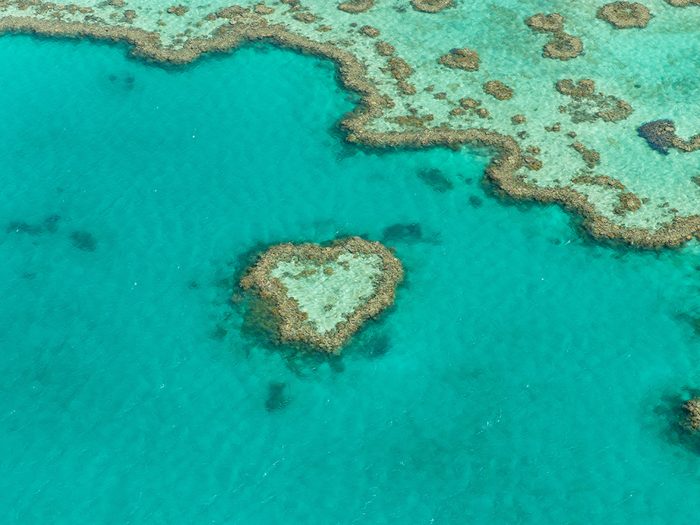
A Victory for Indigenous Rangers
In a region of Australia where few Indigenous rangers are women, the Queensland Indigenous Women’s Ranger Network (QIWRN) is proof that female Indigenous rangers can succeed in a male-dominated field.
Created in 2018, the initiative combines ancient knowledge with modern tools to monitor forest fires, land degradation and the Great Barrier Reef. It also provides a forum for female rangers to share experiences and ideas.
To date, QIWRN has trained more than 60 women. And the initiative is getting noticed: Last December, Prince William and David Attenborough’s Earthshot Prize awarded $1.6 million to QIWRN for its work in protecting the Great Barrier Reef. —Robert Liwanag
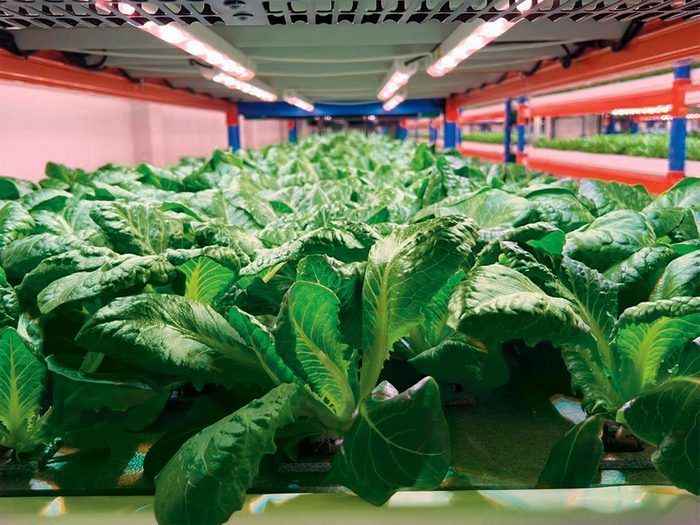
The World’s Largest Vertical Farm
As one of the hottest and driest places on the planet, Dubai, the most populous city in the United Arab Emirates, must import nearly all of its produce. Until now, that is.
ECO 1 is the world’s largest indoor vertical farm. Located southwest of Dubai, the 30,000-square-metre facility grows lettuce, spinach, kale, arugula and other veggies. Even better? It uses 95 percent less water than traditional farms—and no pesticides are required.
All told, ECO 1 can churn out more than one million kilograms of produce every year, and it might just make reliance on food imports a thing of the past in Dubai. —Robert Liwanag

Theatre For the People
Because of high prices and soaring demand, scoring a ticket to the latest West End show in London, U.K., may seem like a luxury. That’s why Cardboard Citizens, a London company that has been producing theatre shows with and for homeless people for more than 25 years, is now offering complimentary theatre tickets to families who rely on food banks or charities for support.
Renowned institutions like the Barbican, Roundhouse and National Theatre are participating in the initiative. “Access to art and culture is essential to the human condition,” says Chris Sonnex, the charity’s artistic director. “The project will give many people the opportunity to be entertained, to see other worlds, to escape and, most importantly, to dream.” —Robert Liwanag
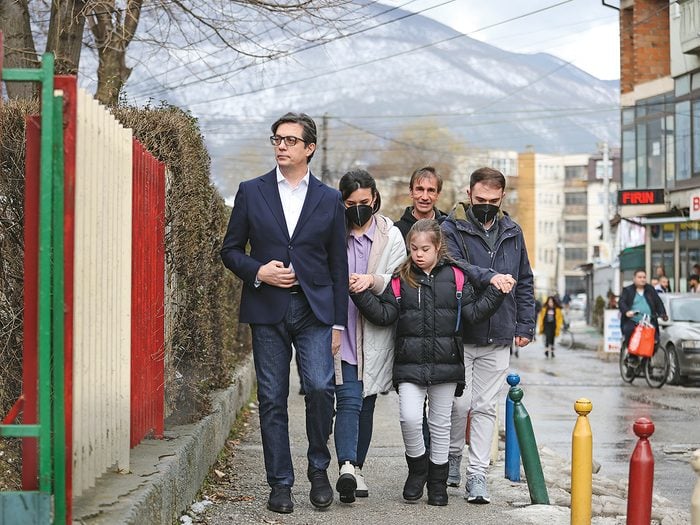
A President Leads by Example
Last year, students at a school in Gostivar, North Macedonia, received quite a surprise when the country’s leader showed up just before roll call.
After President Stevo Pendarovski found out that 11-year-old Embla Ademi, who has Down syndrome, was being teased by classmates and isolated from other children by teachers, he took matters into his own hands. The president, who took office in 2019, visited the family before school, offered Ademi some gifts and then walked with her, at times hand in hand, to school.
In a country where more than half of people believe that children with disabilities cannot be fully integrated into society and 81 percent believe that children with disabilities should be segregated in schools, the president’s act was significant.
Pendarovski’s office issued a statement that said children with atypical development “should not only enjoy the rights they deserve, but also feel equal and welcome at their school desks and in the schoolyard. It is our obligation as a state, but also as individuals, and the key element in this common mission is empathy.” —Tina Knezevic
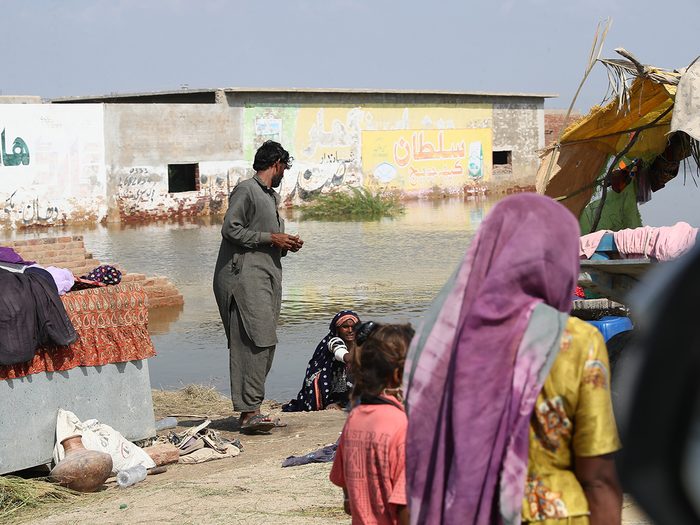
A Solution for Shelter
In 2022, major floods in Pakistan killed more than 1,700 people after monsoon rains and glacial melting. Thirty-three million people were displaced and many are still living in dire circumstances, threatened by diseases, poverty and lack of shelter.
To deal with the latter, Yasmeen Lari of Karachi, Pakistan’s first female architect and a co-founder of the social and cultural advocacy organization Heritage Foundation of Pakistan, has been working to distribute easy-to-assemble bamboo huts. The one-room structures are three-and-a-half metres squared and can sleep up to five people.
Lari, who is in her 80s, has a zero-carbon campus in the nearby town of Makli, where trained female artisans work in teams to make up to eight of the huts per day. She hopes to train others around the country, and the world, to do the same, expanding the reach of the relief program. —Tina Knezevic

Plumbing Services for Those in Need
In the United Kingdom, a local plumber from Burnley, a town north of Manchester, is helping low-income families, the elderly and people with disabilities save on energy costs as prices around the world soar.
After hearing about a customer who got swindled by a plumbing company for the cost of a boiler retrofit, James Anderson was inspired to create Disabled and Elderly Plumbing and Heating Emergency Repair (Depher) to provide free or discounted services to the people who need them most.
He has now expanded beyond Burnley; Depher has helped more than 19,000 people across the U.K. by providing services that are financed by Anderson’s profits from jobs for other clients, as well as donations.
“Whatever someone in a vulnerable situation needs, if they can’t find help elsewhere they turn to us for a solution,” he says. “We can’t just sit back—for some people it’s a matter of life and death.” —Tina Knezevic
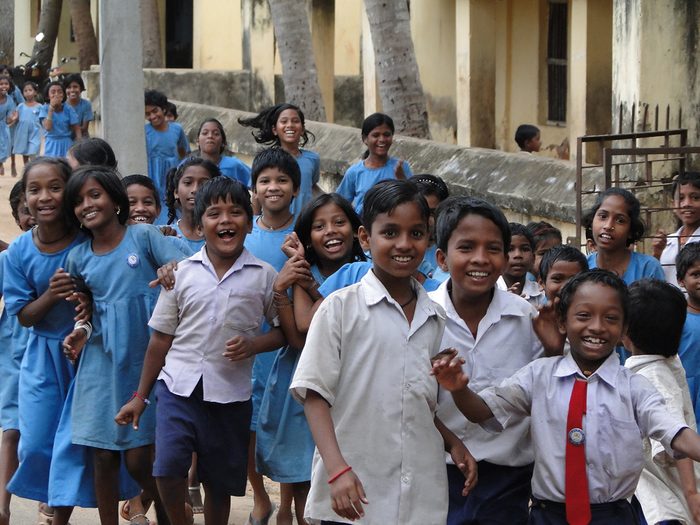
India Lifts Millions Out of Poverty
India has historically had a high poverty rate, which as of late 2022 was defined as living on less than US$2.15 a day. But there are other ways to define poverty. That’s why the United Nations Development Program and the Oxford Poverty and Human Development Initiative measure multidimensional poverty—things like health, education and the standard of living.
A 2022 report from the two groups was promising. It showed that 415 million people in India had gotten out of multidimensional poverty in the span of about 15 years. At the start of the study, in 2005-06, the incidence of multidimensional poverty in the country was 55.1 percent. By 2019-21, it had fallen to 16.4 percent.
The drop is due in part to India’s efforts in sustainability, providing skills training to women and youth and increasing services to vulnerable communities. —Tina Knezevic
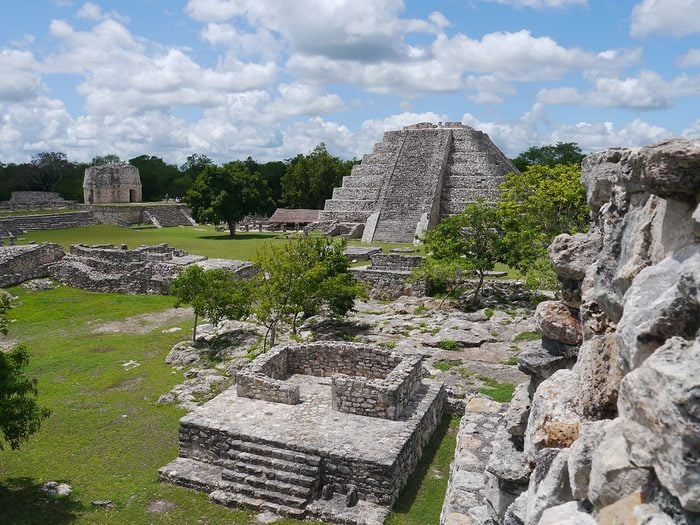
Hiking Through History
Mexico’s first long-distance hiking and cycling trail has just opened in the Yucatán Peninsula. It passes through former Spanish estates (now reclaimed to tell Maya history), sacred freshwater sinkholes and various archeological sites, taking you on a tour of where the first Maya cities were built almost 3,000 years ago.
The Camino del Mayab is a little more than 100 kilometres long. It takes about five days to walk, and passes through 14 Maya communities. The people who live in those communities helped to develop the trail.
Local wildlife includes the turquoise-coloured motmot bird and several types of iguanas. Visitors can also stop in at restaurants offering Maya cuisine or stay in a thatched-roof cabana. —Tina Knezevic
Explore more of the world’s best hikes.
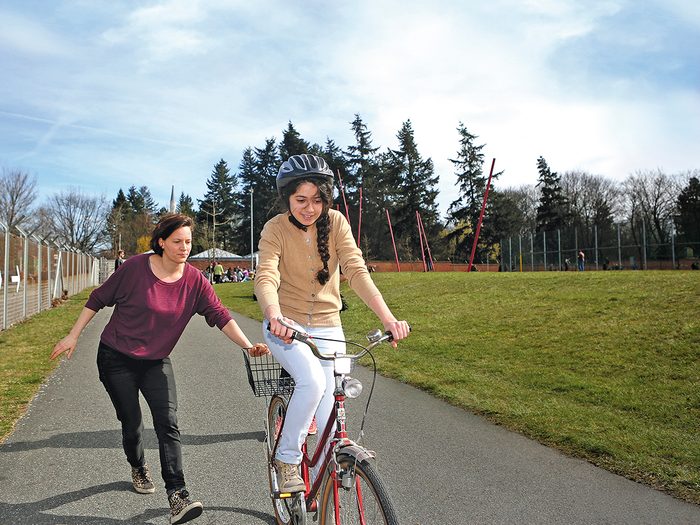
Cycling Lessons For Women
“It’s like riding a bike” is a common refrain when you want to remind someone that it’s hard to forget a basic skill. But what if you didn’t know how to ride a bike?
This was something that Annette Krüger, an avid cyclist, saw was true for many women, including refugees, who’d moved to Berlin. Whether they weren’t allowed—or didn’t have the opportunity—to learn, these women had never experienced the health benefits and independence that cycling offers.
That is why, seven years ago, Krüger started Bikeygees, a non-profit focused on teaching women to ride a bike. The group meets for two hours every month and for training sessions throughout the week. Advanced riders can borrow bikes and helmets for free to practise on their own.
More than 500 bikes have been donated so far, and Krüger says the goal is to eventually provide all participants with their own bike. To date, the group has taught more than 1,400 women and has met in more than 20 locations within Germany, including in emergency shelters.
Participants have said that riding a bike allows them not only freedom of movement—some of the women use them to bring their children to school—but also hope for the future.
Krüger says that she can see the impact that concentrating on a new skill has for the women. “We can’t replace what someone lost in their life, but we can offer something new.” —Tina Knezevic

This Trainer Teaches Independence Through Fitness
Gyms can be intimidating places at the best of times, but this can be particularly true if you have a disability or are elderly. That’s why former pro cricket player and powerlifting athlete Javeno Mclean opened a gym to cater specifically to this crowd.
At his J7 Community Health Centre in Manchester, United Kingdom, he is working with 15 children living with disabilities—some have cerebral palsy, others use a wheelchair—and about 30 older adults. His goal is to help them improve their fitness, gain more independence in their daily tasks and build up their physical and mental strength.
In an interview, Mclean said that training at his gym helps his clients increase their range of movement and, more importantly, gives them the confidence to try new things long after they’ve exited his health centre. —Tina Knezevic
Here are 10 easy exercises to keep fit.
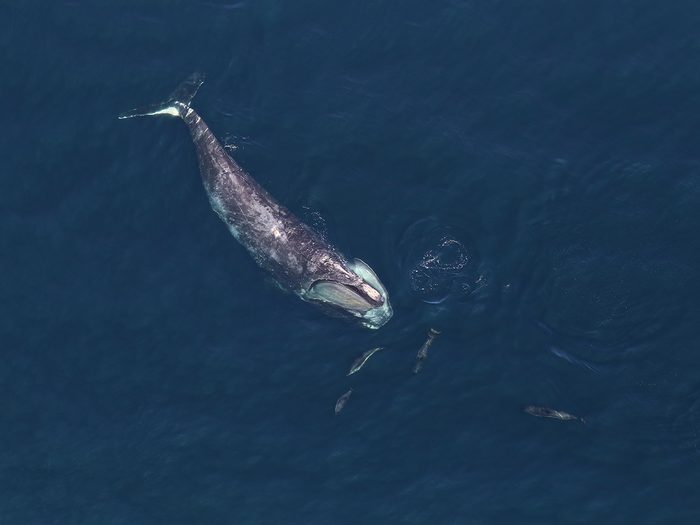
A New Way to Track Whales
How do you find a single whale in a body of water that has a surface area close to the size of Italy? What if that species is at risk of extinction, with only 336 left in the world? These are the questions that scientists are dealing with as they study the North Atlantic right whale in the Gulf of St. Lawrence.
It turns out that the answers could come from outer space. To address the challenge of trying to locate the animals in order to protect them (scientists still don’t know the whales’ specific migration routes into and out of Canadian waters), researchers at the University of Ottawa have started using satellite imagery to identify individual whales from space.
That work will likely help conservation experts track the elusive mammals, which also face the dangers of being hit by passing ships or getting tangled up in fishing gear. Knowing the endangered whales’ migration routes could one day lead to the creation of alternative, and safer, shipping routes that avoid these areas. —Tina Knezevic
Check out more Canadian contributions to the exploration of space.
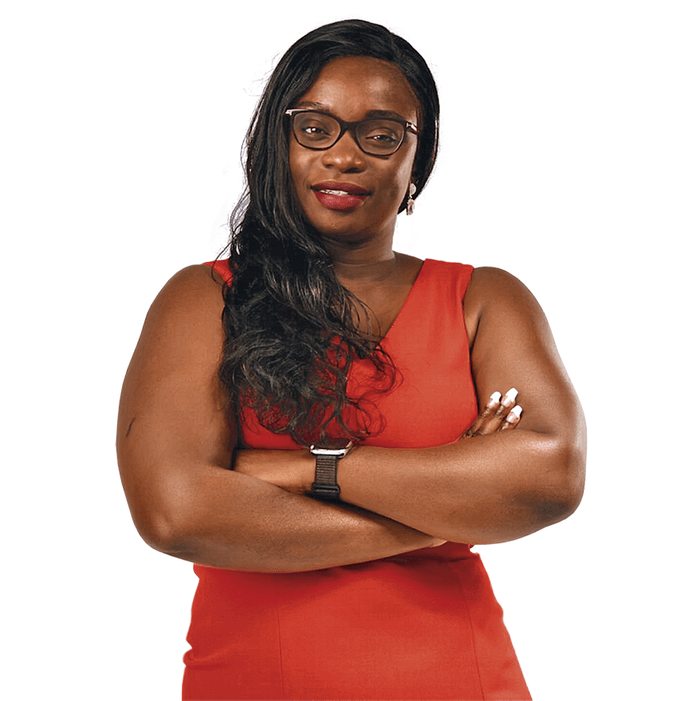
She Helps Make Childbirth Safer
Women giving birth in a public hospital in Liberia are required to bring with them essential items—including bleach, diapers and menstrual pads—to help make the delivery safer for themselves, their baby and the staff.
Why? The heavily strained Liberian health-care system remains severely underfunded following more than a decade of civil wars and an Ebola outbreak. But the policy of not admitting women who don’t have their own supplies only increases the country’s already-high death rates among newborns and new mothers.
Yassah Lavelah, a nurse and researcher from Liberia’s capital, Monrovia, decided to investigate the issue further while completing graduate studies in global health delivery at Harvard. Women told her that, despite the risk, a home birth was their preference—with one of the main reasons being that they couldn’t afford to buy the required items for a hospital birth.
So, in 2021, Lavelah created Comfort Closet, a project to supply pregnant women with everything they need to be admitted to hospital. She’s now working with a collaborator to raise money for two more Comfort Closets in other Liberian communities.
“Giving birth shouldn’t be a death sentence for women only because they can’t afford it.” —Tina Knezevic
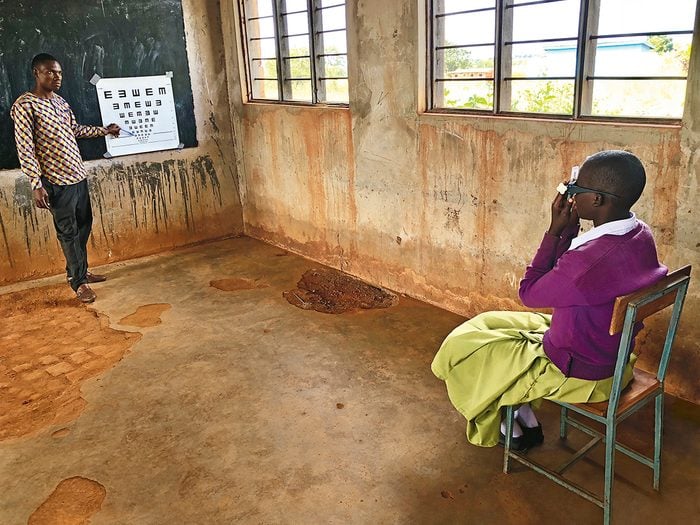
Accessible Vision Care For All
In many parts of the world, access to glasses, let alone an optometrist, is severely limited. This is something that Kevin White, a now-retired marine, noticed in 2005 while observing a humanitarian mission in Morocco.
The United States Air Force had set up an optometry clinic, which included giving away donated eyeglasses. White watched as one woman was prescribed a pair, only to decline to wear them based on the style.
“I thought, there needs to be a better way for us to get people wearing glasses,” he says.
But at that time, there were no programs that embraced the idea that glasses were both a medical necessity and a fashion accessory. A style that the user likes makes it more probable that they will wear them.
So White launched Global Vision 2020, collaborating with experts at Johns Hopkins University and the New England College of Optometry to create the USee Vision Kit, an easy-to-use diagnostic kit.
It works like this: using a simple eye chart, aid workers help children and adults determine whether they need glasses. If they do, they then put on the USee device—which looks like a pair of glasses—and turn the dials until they see clearly out of both eyes. The numbers on the dials indicate their prescription and corresponding lens.
All that’s left to do is pick a frame colour and snap in the correct lenses. White says that while they currently offer Wayfarer-style frames that suit the majority of faces, they’re hoping to offer more frame styles in the future.
To date, more than 200,000 people in 65 countries have benefited from the program, and eventually White wants to see that “everybody, regardless of geography, can get screened for a pair of glasses.” —Tina Knezevic
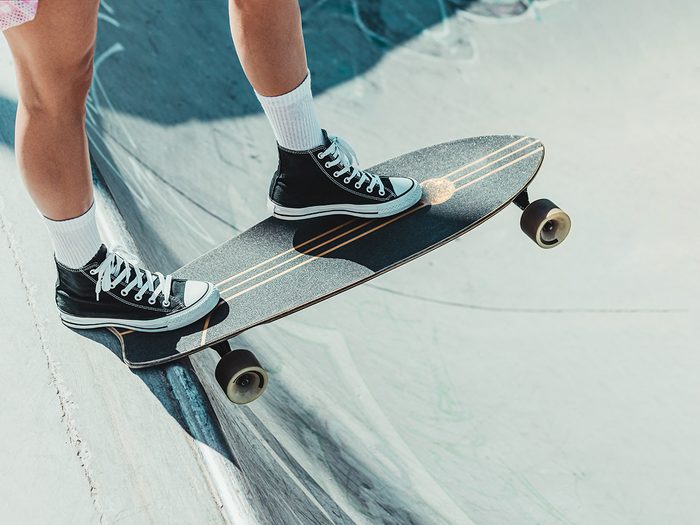
People With Disabilities Can Use This Skate Park
Alley-Oops indoor skate park in Birtinya, north of Brisbane, Australia, is helping people of all ages and abilities experience the thrill of skateboarding and scootering.
The park is open to everyone but there’s also an accessible option. Skaters are strapped into a harness attached to a custom-built frame on wheels. With this, they get to try rails, jumps and pipes with help from someone who pushes the frame through the different elements in the park.
Former owner David King says that he often saw youths with physical limitations sitting on the sidelines of other skate parks. He wanted to create something more inclusive.
The park’s new owners, Lauren and Chris Hignett, continue to find ways to improve the frames. They also offer “quiet sessions” for people with autism spectrum disorder or sensory disorders who might find the usual sounds of a skate park too loud. —Tina Knezevic
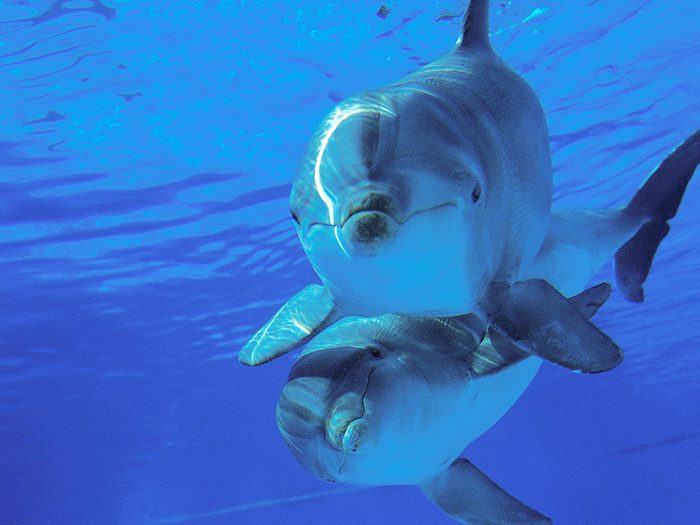
A Captive Dolphin Swims Free
After 17 years of living in an aquarium on South Korea’s Jeju Island, Bibong, an Indo-Pacific bottlenose dolphin, was released into the wild in October last year.
He had lived in captivity, where he performed for visitors, since 2005. Bibong was the last of eight dolphins from different Korean aquariums to be freed; the others were released between 2013 and 2017. Dolphins don’t thrive in captivity—the smart and social animals can get anxious, depressed and bored when they’re kept in enclosures.
To make sure he would be prepared for life in the wild, Bibong spent 70 days learning to swim in the ocean, interacting with other wild dolphins and dealing with strong currents. Before his release, Bibong was fitted with a tracking device to allow government staff to check on him. —Tina Knezevic
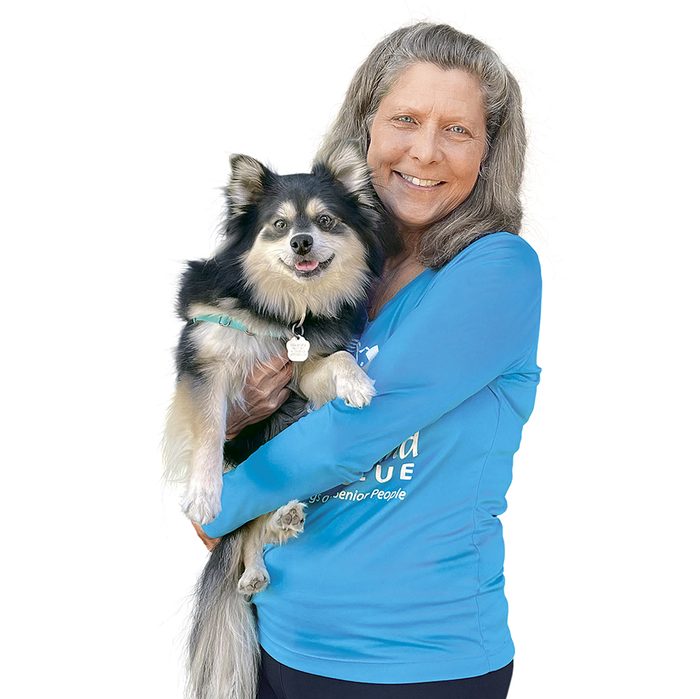
Seniors’ Dogs Get a Helping Hand
Carie Broecker, a lifelong animal lover, had already worked on the board of an animal rescue organization in Pacific Grove, California, for 12 years when she found herself taking care of a dog for an elderly woman who had emphysema.
The woman had been worried about what would happen to her dog, Savannah, and was comforted whenever Broecker brought the pup over to visit. After the woman’s death, Broecker ended up adopting Savannah.
This experience inspired Broecker. She decided to open a dog rescue non-profit dedicated to taking care of dogs belonging to people who were dying or going into assisted living facilities. The organization would offer both short-term foster arrangements and full adoptions.
She asked a former colleague, Monica Rua, to work with her. Rua agreed to help and suggested they also take in senior dogs from shelters, who are often bypassed.
To date, Peace of Mind Dog Rescue has helped thousands of dogs and seniors with everything from temporary fostering during medical procedures to financial assistance for pet care and rehoming dogs whose owners have died.
“Sometimes a person’s only source of love is their pet,” says Rua. “So anything we can do to keep an owner and their dog together is meaningful.” —Tina Knezevic
These are the best dogs for apartment living.
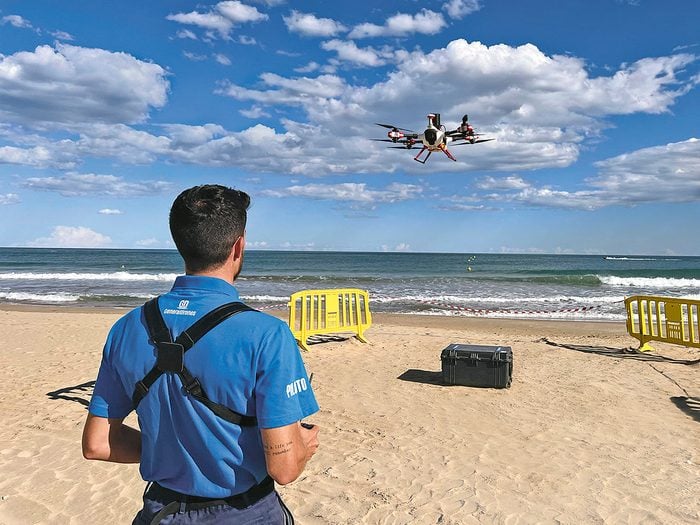
These Lifeguard Drones are Actually Helping to Save Lives
Every year, around 263,000 people worldwide die by drowning. And while we may think that a drowning person thrashes about and waves for help, real-life drownings often happen quickly and silently.
Adrián Plazas, a former lifeguard, knows this all too well. Several years ago, he and his business partner, Enrique Fernández, witnessed a woman drowning, and despite acting quickly, they were unable to save her. This experience was life-altering for Plazas.
The industrial engineer is now CEO of General Drones, a Spanish company he founded with Fernández, who works in drone manufacturing. The two combined their knowledge to create a search-and-rescue drone that can help prevent drowning.
If a lifeguard notices a person in distress in the water, they can notify a drone pilot, who’s also at the beach and can send the drone out directly to the victim. The pilot locates the victim with the help of a camera attached to the drone, which can reach them in just a few seconds.
This is important, says Plazas, because “the lifeguards have more time to arrive.” The drone then drops a life vest (which automatically inflates when it touches the water) to the victim while lifeguards are en route. By hovering above the victim, the drone helps the lifeguard quickly locate the person who is struggling in the water.
Though the project started in 2015, Plazas says it took time to get from a prototype to a finished product. “It was important to design something specifically for the beach because it’s a tough environment. You have the humidity, the sun, the high wind,” he says.
To date, their drones have attended more than 60 emergencies, and have been deployed at 22 beaches in Spain. He’s hoping that more investments and attention will help them expand their services to other countries. —Tina Knezevic

Canada’s New Hotline For Immediate Mental Health Help
Everyone knows that when there’s an emergency, you dial 911. But what if you’re having a mental health crisis? A 2020 CBC investigation showed that 68 per cent of people killed in police encounters in Canada have suffered from mental health or addiction issues (or both).
This is part of why, later this year, Canada is introducing a new emergency number to help people experiencing mental health crises and provide suicide prevention support. When it launches, 988 will be available countrywide, and advocates hope the number will provide people in crisis with an easy way to access help either by phone or text. —Tina Knezevic
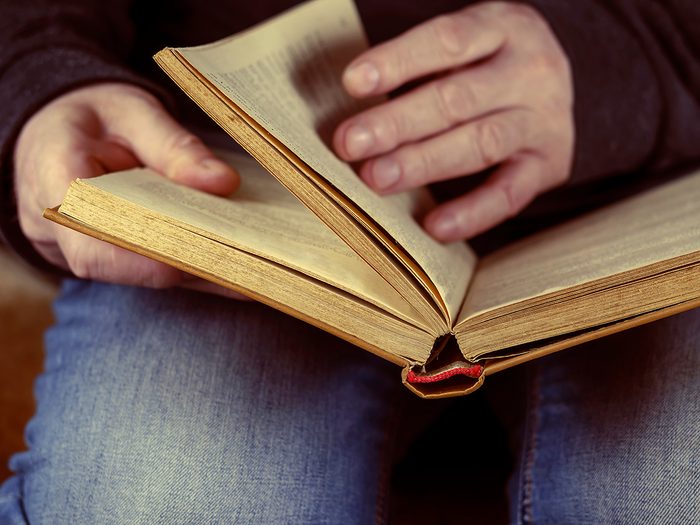
Reigniting a Love of Reading
In the Mediterranean city of Tartus, Syria, Mohamed Zaher spends his time manning a kiosk called Wisdom Seller, which invites passersby to stop and read from the more than 2,000 books that line its walls. To encourage visitors to stick around, anyone who reads at least 15 pages of a book gets a free coffee. The 32-year-old veteran is encouraging his fellow Syrians to get back into reading after the war made certain luxuries, including printed books, unaffordable for many of its citizens.
Zaher says reading was “therapeutic” for him during his time in battle. To keep the kiosk going, he depends on funding from affluent local citizens—but everyone is encouraged to come by. He estimates that more than 20,000 visitors of all ages have stopped by his stall since its opening. —Tina Knezevic
Find out why you should always read before bed.
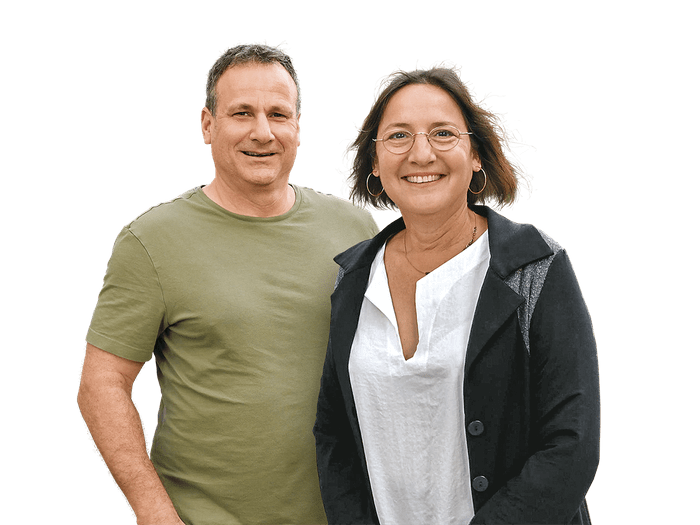
Harnessing the Power of Design
In Tel Aviv, summer temperatures reach the low 30s and sunlight shines down on the city for about 11 hours a day. So its residents are no strangers to hot weather. And with temperatures around the world projected to continue rising as a result of climate change, it’s not going to get any easier to find respite from the heat. But where some people see problems, industrial and product designer Anai Green sees opportunity.
In 2019, she had the idea to combine her city’s need for shade during the day with the chance to harness the sun for lighting at night. So she created Lumiweave, a fabric embedded with solar panels that catches up to 99.5 per cent of sunlight radiation but also stores solar power, which acts as street lighting in the evening. The fabric can be customized for any city’s needs, whether fitted on a frame, like an umbrella, or hooked between buildings.
When asked about the motivation behind her design, Green says she wanted to change the way people experience their environment. “I took very basic issues and combined them.” —Tina Knezevic
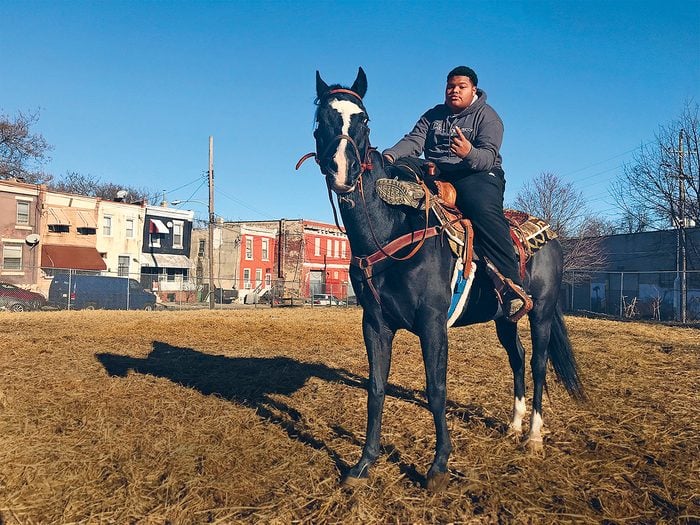
Horses Empower and Equip Youth
United States | Take a walk through the community of Strawberry Mansion in northern Philadelphia and you might think you’ve stepped into a scene from the Old West—except in these streets, Black cowhands ride their horses alongside cars and trucks. The area, which was the setting for the 2020 film Concrete Cowboy starring Idris Elba, has been home to stables for more than 100 years but, since the 1980s, it has also been a haven for youth looking to escape gang violence.
Known throughout the neighbourhood as “El-Dog,” 83-year-old Ellis Ferrell Jr. runs the Fletcher Street Urban Riding Club (FSURC). Though iterations of the club have existed since the 1970s, FSURC was officially founded as a non-profit in 2004 and is funded mainly through private donations—it has raised more than $350,000 through crowdfunding.
The club keeps 15 horses and instructs young people from the area how to ride, train and care for the animals, while also teaching life skills such as teamwork and self-discipline. “The kids stay out of trouble because they’re always here with the horses,” Ferrell says. “They don’t have time to get into trouble.”
He estimates that more than 100 youths have been a part of the club and says that some have gone on to become firefighters, police officers and, in one case, a jockey. “They’ve become like a family,” he says. “Taking care of the horses teaches them respect for other people and for themselves.” —Robert Liwanag
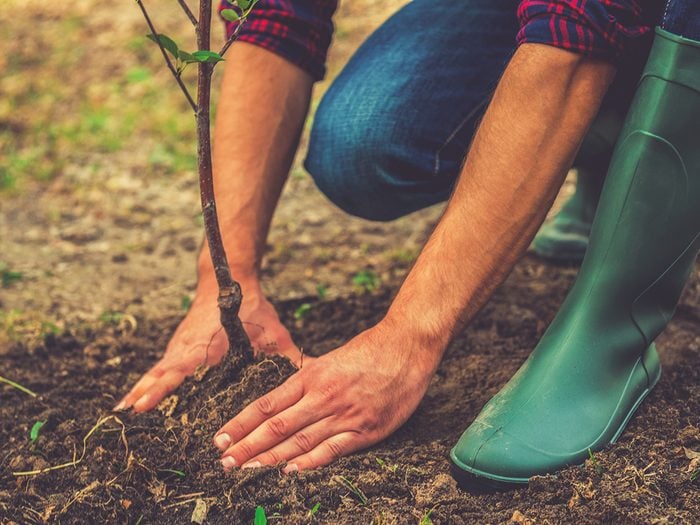
A Mining Cities Goes Green
Canada | Greater Sudbury in northern Ontario was once one of the largest producers of nickel on the planet, but the 2008 global financial crisis and dwindling reserves led to a sharp decline in output. The area’s nickel mining was also notorious for causing air pollution and was even at one time the largest source of sulphur dioxide in the world.
For more than 40 years, however, the city has embraced a very different pursuit: tree-planting. Since 1978, nearly 13,000 volunteers have transformed roughly 3,400 out of 80,000 hectares of barren landscapes—the devastating result of nearly a century’s worth of mining and smelting—into thriving greenery. Last July, Prime Minister Justin Trudeau and primatologist Jane Goodall helped plant the project’s 10-millionth tree.
Thanks to the re-greening effort, Greater Sudbury now boasts some of the cleanest air in Ontario, and there’s hope it can inspire other municipalities to follow suit. —Robert Liwanag

Challenging the Stigma of Stammering
United Kingdom | More than 1.5 million adults in Great Britain report having a stammer, according to a survey by the British Stammering Association (STAMMA). Of that number, around 70 per cent of British adults try to hide it by choosing their words more carefully or speaking less. The stigma attached to the disorder can often lead to low self-esteem and social isolation for the people it affects; to help combat that, the organization is transforming the public’s perception of stammering.
Since 2018, STAMMA has launched a series of awareness campaigns. One such campaign, “No Diversity Without Disfluency,” calls for broadcast media to feature more people who stammer.
“It is time to end the zero visibility of stammering,” said Jane Powell, CEO of STAMMA. “Until we hear and see people who stammer in the media, people will continue to respond inappropriately.” The organization has already collaborated with one radio show to hire a broadcaster with a stammer. —Robert Liwanag

Refugees Harness the Power of Storytelling
Jordan | Built around the belief that everyone has a right to tell their own stories, an organization in Jordan is hosting mindfulness, creative writing and public-speaking workshops for more than 1,500 refugees. The sessions, which have also been held in cities across Turkey, Lebanon and Germany, are hosted by #MeWe International. The non-profit was founded in 2014 and helps participants work through severe trauma brought on by discrimination and, in many cases, violence.
According to New York-based founder Mohsin Mohi Ud Din, the key to the workshops is that they are taught by other refugees, creating a unique community that’s “for the people, by the people.”
The results are compelling, he says: participants have reported reduced aggression and improved communication skills. At the end of the sessions, they’re invited to tell their stories through theatre productions, book projects and the like. —Robert Liwanag
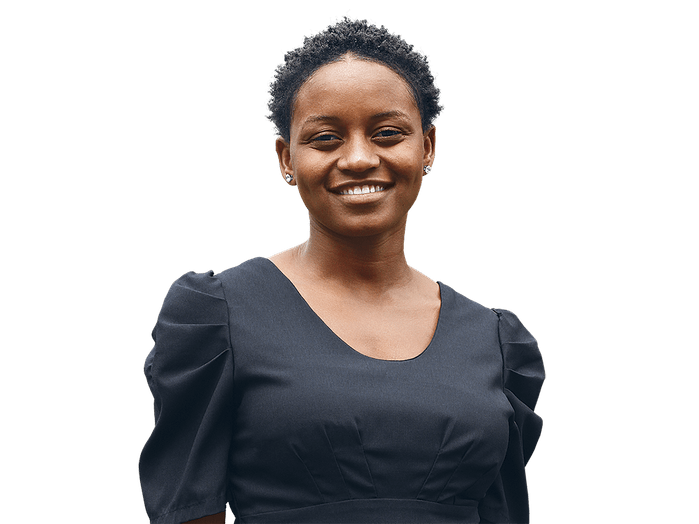
Fostering Global Tech Talent
Kenya | In rural Kenya, 4,000 students across 10 schools are busy sharpening their computer skills on refurbished machines. They learn everything from basic typing to coding to robotics, and even take part in remote tutorials with NASA scientists. Before participating in these classes, however, very few of the students even knew what a computer was.
The project, TechLit Africa, is the brainchild of Nelly Cheboi,a 29-year-old software engineer who grew up in poverty in the Kenyan village of Mogotio. In 2012, she received a full scholarship to attend college in Illinois, where she discovered a love for computer science. Upon returning to Kenya after graduation, she founded her own school, Zawadi, which became a launching pad for TechLit. Her organization now works with American colleges and businesses to source the recycled computers.
For Cheboi, TechLit is about more than just giving children a pastime: she hopes the students will use their newfound skills to find professional opportunities.
“If all you have is your small village, then your thinking is small,” Cheboi says. “But once you come to the Internet, you become global—and by being global, you can help the world.” —Robert Liwanag
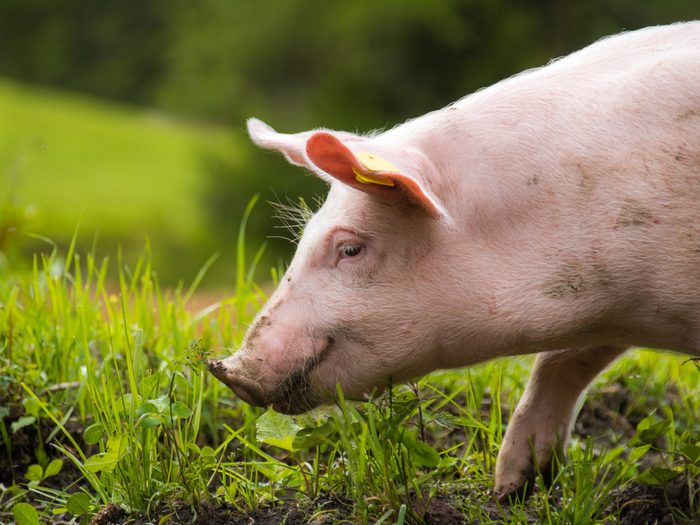
Airport Pigs Help Keep the Skies Safe
Netherlands | They didn’t get badges or uniforms, but they did receive a generous meal allowance. Near Amsterdam’s Schiphol Airport, 20 pigs joined a six-week pilot program designed to reduce the number of goose strikes at the busy international hub. The pigs were allowed to settle in a two-hectare sugar-beet field between two of the airport’s runways. The hope was they’d eat up any plant life that appeals to geese and, by their presence, would intimidate other birds in the area, too.
Collisions between birds and aircraft are a nagging problem in aviation—in 2020, there were 150 avian strikes at Schiphol—and these incidents can have serious consequences. Fortunately, the pig patrol appears to have been a success: no bird strikes were recorded during their stay. The airport is currently assessing whether to make the pigs a permanent feature of its overall safety program. —Flannery Dean
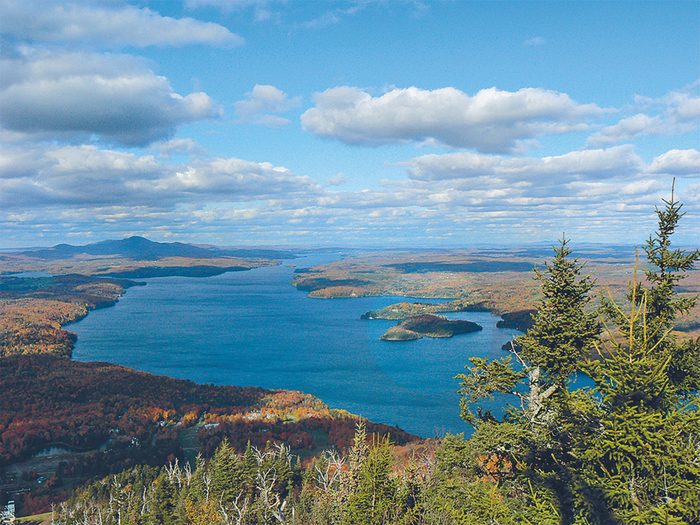
The Businessman Who Donated an Island
Canada | There are few things rarer than pristine wilderness. This is true in Canada, which according to Global Forest Watch ranks third in the world for forest cover loss. It’s what makes the recent donation of a forested island within a freshwater glacial lake in Quebec so worthy of celebration.
Last fall, Montreal businessman Andrew Howick donated 26 hectares—the equivalent of 24 soccer fields—of richly forested Molson Island to the Nature Conservancy of Canada. He first began buying up parts of the island in the 1990s as a way of protecting aquatic birds and rare, diverse plant life. The donation of the island—made possible by tax incentives for such land donations—means it will escape development and thrive for decades to come. —Flannery Dean
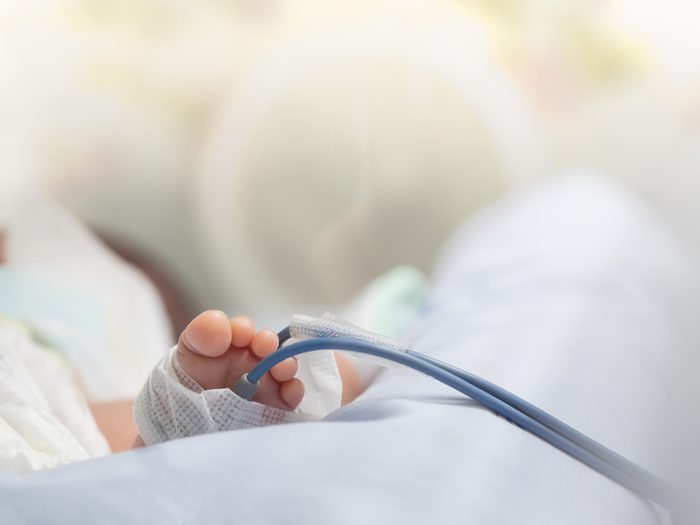
The Nurses Who Saved 35 Newborns From a Fire
Philippines | Last May, during a fire at the Philippine General Hospital in Manila, two nurses made sure no one was left behind in their fourth floor neonatal intensive care unit. Kathrina Bianca Macababbad was bathing one of the unit’s babies just after midnight when she heard that a fire had broken out on the floor below. As the flames raged, she and fellow nurse Jomar Mallari made multiple trips in and out of the building with their charges. The biggest challenge was rescuing premature babies who were intubated and dependent on ventilators to breathe. Holding the babies in one arm while manually ventilating them with the other hand, the nurses managed to get all 35 of their tiny patients to safety. —Flannery Dean
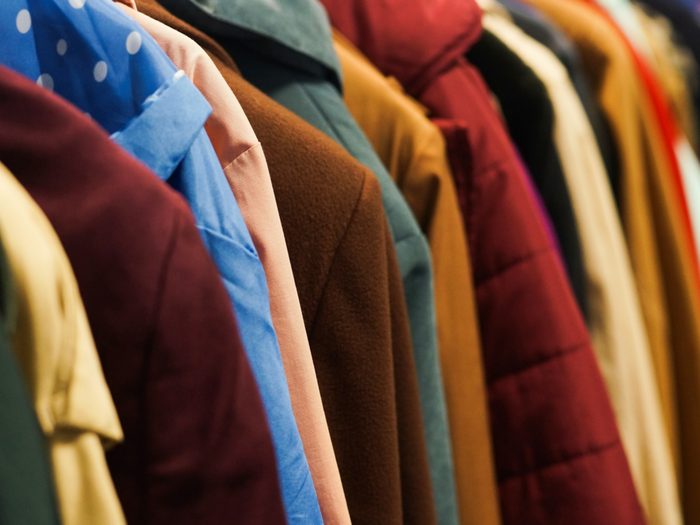
Restocking the Wardrobes of Female Refugees
England | Poverty brings with it many challenges, not the least of which can be the strain of sorting through clothing donation bins, on a mission to find the right-sized wardrobes for you and your family. Believing that female refugees deserve more than a bag of random castoffs, Sol Escobar, a Cambridge educator and a volunteer at migrant refugee camps, had a novel solution. In 2020, she created Give Your Best, an online “shopping” site that allows women to choose from an array of donated clothing posted by volunteers. All of the clothing is free and can be “shopped” on the site’s Instagram page. Once selected, the items are shipped for free within the United Kingdom. Since its launch, more than 700 women seeking asylum or with precarious immigration status have claimed 7,500 items. —Flannery Dean
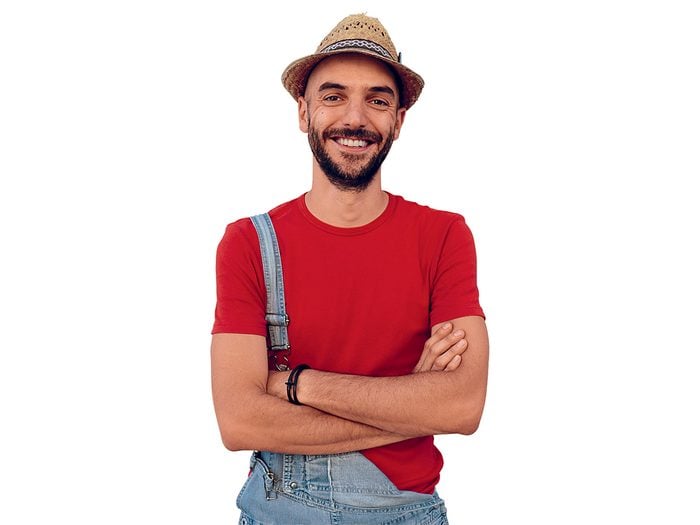
Fighting Hate With Art
Italy | The number of reported hate crimes has steadily increased in Italy since 2014, fuelled by incendiary populist politicians reacting to an influx of refugees and migrants. In Verona, Pier Paolo Spinazze, a street artist who goes by the name Cibo (Italian for “food”), is being celebrated for his creative countermeasures. “Verona is beautiful,” says Spinazze, “but it has a big problem with the far right.” Whenever he encounters swastikas and other racist graffiti, he paints over them with colourful depictions of his favourite foodstuffs, from cupcakes to pizza.
His art has two positive effects. The extremists often spray-paint over Spinazze’s cheerful food pictures, but he simply re-paints over their hateful messages again, and they usually give up. The other positive improvement: his paintings are awakening Verona’s citizens to the seriousness of the problem. “Before I started this, people were so used to seeing those messages, they didn’t really see them at all. Now people start to see and understand.”
To Spinazze, food is a natural corrective to hate. It represents a language that connects people and cultures. “Food is about union and sharing,” he says. “We are all equal around a table—everybody eats.” —Flannery Dean
Find out how a Canadian charity is using art to fight homelessness.
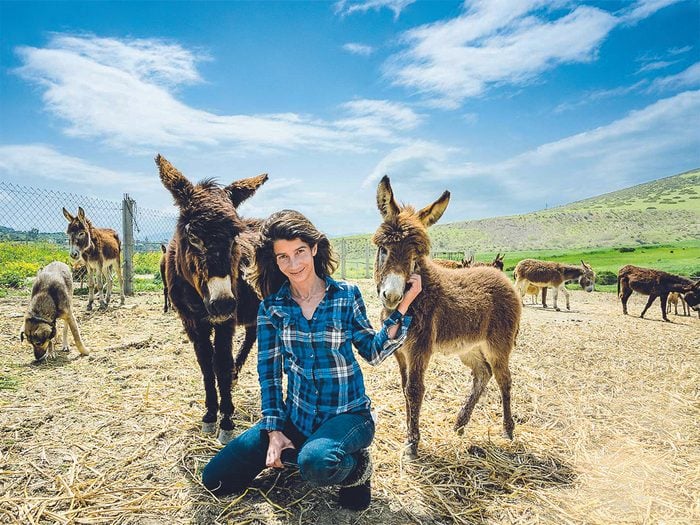
A Safe Haven for Rescued Animals
Morocco | As a child in Tangier in the late 1970s, Salima Kadaoui made it her personal mission to save strays from animal control. At eight years old, she volunteered at an animal charity and saw firsthand how the city’s lack of vaccination, neutering and spaying programs only exacerbated the challenging situation. “I would go home and cry and say this is unacceptable,” she says. “I promised myself that I would change my country and that promise stayed with me.”
In 2012, after raising her family in the United Kingdom, she returned to Morocco to care for an ailing parent. She also made good on her childhood vow, founding the Sanctuaire de la faune de Tanger. Located just outside Tangier, it’s currently home to more than 450 dogs, 100 cats, 48 donkeys, two wild boars, an ape, two storks and a mule, among other small creatures. The sanctuary, which receives its funding from donations, is run by 14 employees, half of whom were once homeless and now live on site. They collect stray animals, get them neutered and vaccinated, and bring them back to the sanctuary.
Caring for dogs takes up much of their time. There are an estimated three million stray dogs in Morocco today. In Kadaoui’s assessment, poverty and cultural beliefs often set the country’s stray animals and residents against one another. To date, she and her team have treated, neutered and vaccinated more than 3,000 dogs.
During the pandemic, they also delivered food and essentials to both the city’s homeless population and its starving strays. Kadaoui believes her work has ultimately helped people feel more sympathy for animals. “It connected their plights,” she says. “And now more people care.” —Flannery Dean

How Mariachi Brings a City Together
United States | Boston, a city synonymous with Irish-American culture, is also home to more than 130,000 Latino residents, who make up nearly 20 per cent of the city’s population. When professional mariachi performer Veronica Robles decided to settle there with her husband 22 years ago, however, she noticed that the Latino community suffered from the effects of cultural dislocation. Every day, they also encountered racist stereotypes about Latin-American culture.
“They were afraid or ashamed of saying they were Latino,” says Robles, who was born in Mexico City. To help Latino immigrants reclaim their sense of self and a connection to their cultural heritage, the couple began offering night classes in the art, music and dance of Central and Latin America at a school cafeteria.
Then, in 2013, Robles and her husband, using their own money, opened a dedicated facility. At the Veronica Robles Cultural Center, they offer everything from flamenco to capoeira classes. Robles estimates the centre has so far hosted more than 5,000 students. Over the years, she’s seen her students, who range from children to seniors, develop a better sense of themselves—and even feel more comfortable in their new home.
“They’re more confident, they’re more educated and they’re more eager to learn English,” she says. “Some who are undocumented try to find a way to adjust their status. They are looking to stay here.” —Flannery Dean
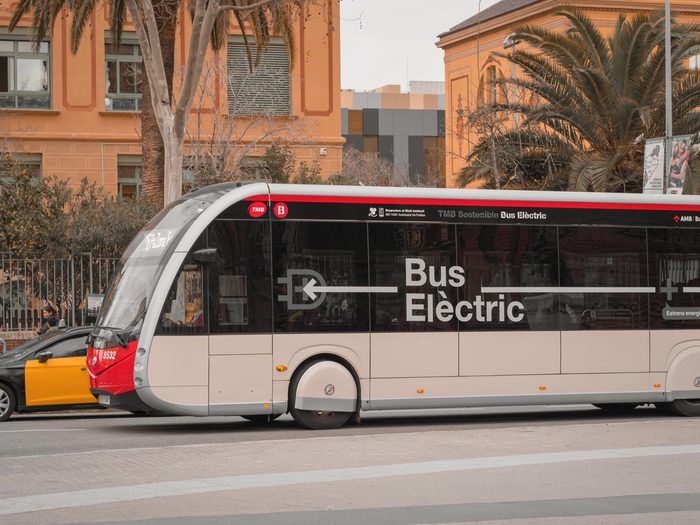
Ditch Your Car, Get Free Transit
Spain | The push is on around the globe to reduce harmful greenhouse gas emissions and break our collective reliance on fossil fuels. To encourage greener forms of getting around, many countries are offering rebates on electric cars. The city of Barcelona, however, is offering up a trade: lose the gas guzzler and ride public transit for free. People who trade in or get rid of cars that don’t meet environmental specs are given a free transit pass that lasts for three years. The approach isn’t just environmentally sound, it’s cost-effective for residents. And it may significantly reduce the stress of car ownership, too. —Flannery Dean
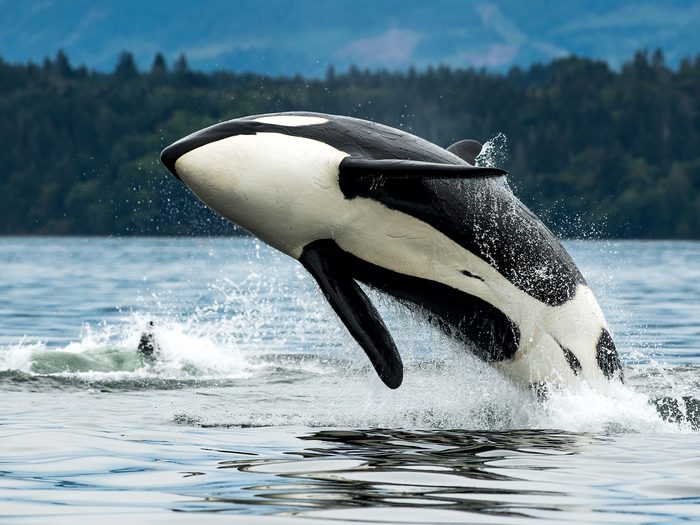
North America’s First Whale Sanctuary
Canada | An estimated 60 killer whales are being kept in captivity at large marine parks and sea aquariums. Soon, some of them will experience the joys of retirement. North America’s first wild refuge for captive orcas (potentially beluga whales, too) aims to open its 40-hectare coastal location in Port Hilford, a small town near Sherbrooke, Nova Scotia, by early 2023. (The operation’s headquarters and visitor’s centre are already complete.)
The refuge, which will contain underwater nets to keep the whales free but still contained, has a depth of 16 metres and provides the whales with 150 times more space than they’ve known in captivity. After passing the environmental-assessment stage, the site will one day welcome six to eight whales into its waters. —Flannery Dean
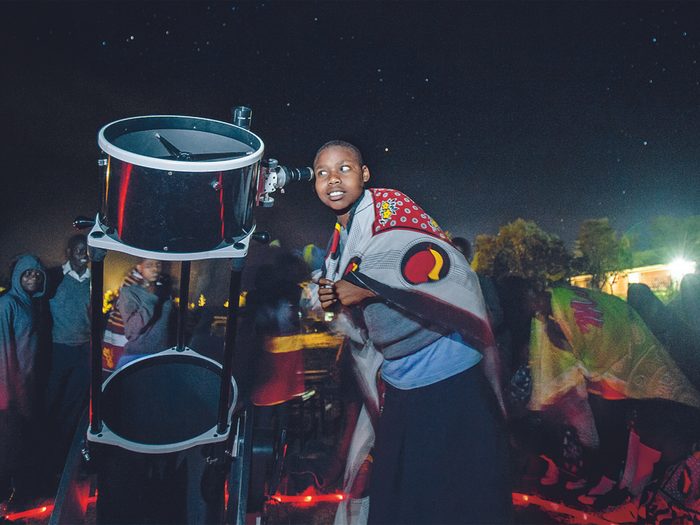
Catching a Glimpse of the Stars
Kenya | As a child growing up in Nairobi City, the astronomer Susan Murabana didn’t get much encouragement to look to the stars. The solar system wasn’t a big part of her school’s curriculum.
Her disappointment turned to wonder in her early 20s, when she encountered her first telescope and spotted Saturn and its icy rings. “Seeing something I had only read about in a textbook, it made me realize how small we really are.”
In 2014, Murabana, now married, bought a telescope with her husband. Inspired by how studying space had opened up her life, the couple decided to give kids the same experience. They called their program The Travelling Telescope, and circle around Kenya bringing astronomy education and a portable planetarium to schools and communities. So far, they’ve met with 300,000 children in the process.
Kids can’t resist the lure of the telescope and the opportunity it offers to see the moon (a favourite) up close, as well as stars and planets. Murabana says the telescope is the main attraction wherever they go. In January 2021, the visiting musical artist Madonna booked a private session for her family. Murabana watched the pop star’s face light up with the same sense of wonder.
“It’s a way of reminding people about the universe that sits just above their heads, and that they remain an intrinsic part of,” she says. “It’s there, but we forget to look up.” —Flannery Dean
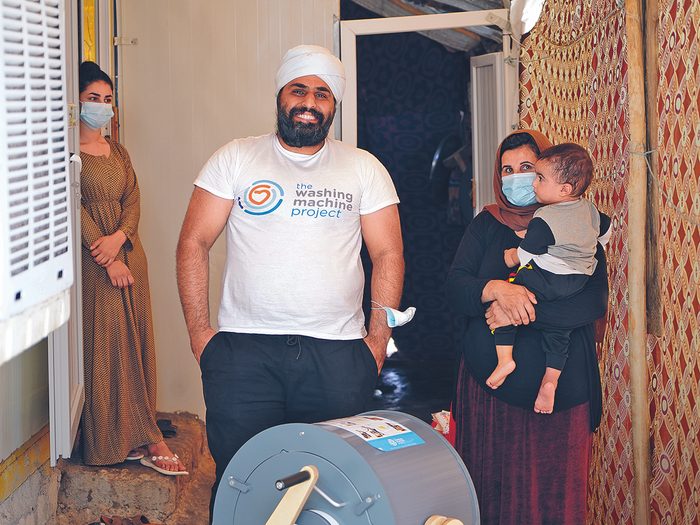
Making Refugees’ Lives Easier
United Kingdom | For the 70 per cent of the world’s population without access to electric washing machines, simply keeping up with laundry is a time-consuming, often painful physical task. The burden falls disproportionately to women and girls, who can spend 20 hours a week hand-scrubbing clothes, often without electricity or running water. London engineer Navjot Sawhney, however, has come up with an off-grid solution: a portable, lightweight and hand crank-powered washing machine that resembles a plastic drum. It also does double duty as a dryer, and costs around $60.
The 31-year-old Sawhney calls it the Divya, after the woman who inspired the project—his former next-door neighbour in South India, where he spent a year volunteering after leaving his job as an engineer at high-end vacuum maker Dyson. “When I got to know Divya, I was so frustrated by all the unpaid labour she needed to do for the sake of clean clothes,” says Sawhney. He returned to the United Kingdom to found the Washing Machine Project in 2018. After a few months developing a prototype, he received a grant from Oxfam’s Iraq Response Innovation Lab.
Since March 2019, more than 150 Divyas have been distributed to refugees in Iraq through non-profit partners. “The feedback was overwhelmingly positive,” Sawhney says. His goal is to deliver 8,000 machines in 10 countries over the next three years. By saving 75 per cent of the time and 50 per cent of the water required to wash clothes, he says, women and girls will be freer to pursue education.
Aside from the Divya, Sawhney has also worked on making clean and fuel-efficient cookstoves, and plans to develop off-grid refrigerators, air conditioners and lighting. Sawhney, whose father had to flee his home during the Partition of India in 1947, sees the world’s growing refugee crisis as an urgent call for innovation: “There is a huge need for appliances that make life better for people.” —By Anna-Kaisa Walker
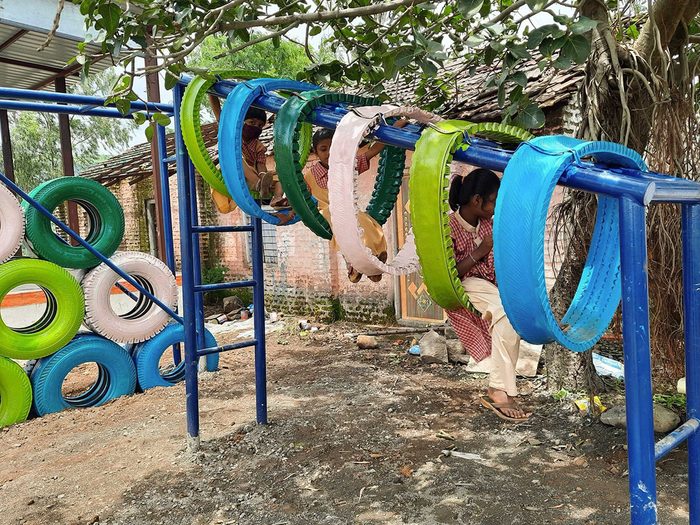
Turning Old Tires into New Playgrounds
India | In and around more than a dozen cities in India, brightly coloured caterpillars, octopi and elephants have begun appearing in empty lots, much to the joy of local children. Built from old tires and industrial waste like scrap metal and ropes, these climbers, jungle gyms and swings are low-cost, sustainable play spaces created by Bangalore’s Anthill Creations. A new playground can be built in just five days for around $2,500, a fraction of the cost of a standard playground.
The project’s CEO, Pooja Rai, a trained architect, was inspired to found Anthill Creations in 2014 after watching children at an orphanage play with broken pipes and flip-flops—far from a luxury, play is a human right, she realized. Reusing some of the 100 million tires discarded in India every year also helps the environment, reducing the air pollution created by tire burning. Each tire is carefully cleaned, inspected and painted before being repurposed in the 300 playgrounds Anthill has so far built across India.
Rai aims to work with governments, corporate donors and Anthill’s team of about 30 active volunteers to make cities more child-friendly, converting empty lots into playful community spaces. “Children come up with hundreds of different games exploring their creativity, and there is something new every time they play,” Rai says. —By Anna-Kaisa Walker
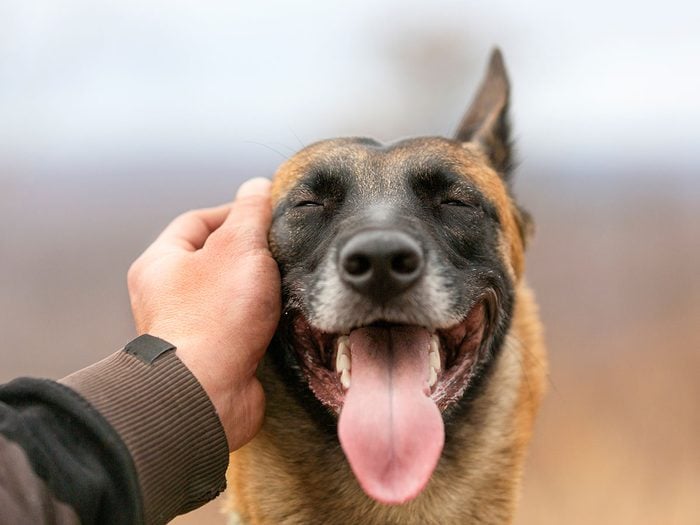
Finding Shelter Animals Homes—Through Tinder
Germany | Looking for a long-term relationship with someone single, lonely and a little on the furry side? Your next date could be with an adorable dog or cat—all you have to do is swipe right. Faced with an influx of animals who had been adopted during lockdowns and then surrendered when owners returned to work, the Munich Animal Welfare Association teamed up with an advertising agency to create “dating” profiles for 15 adoptable pets on the popular app Tinder. Complete with professional photos and a bio that includes likes and dislikes—Captain Kirk, for example, a two-year-old black and white cat, enjoys cuddles but not small children—the pet profiles have received an overwhelming number of right swipes, says the shelter. After being screened, prospective adopters can arrange a meet-and-greet with their new match at the shelter. —By Anna-Kaisa Walker
These pet adoption stories will warm your heart!
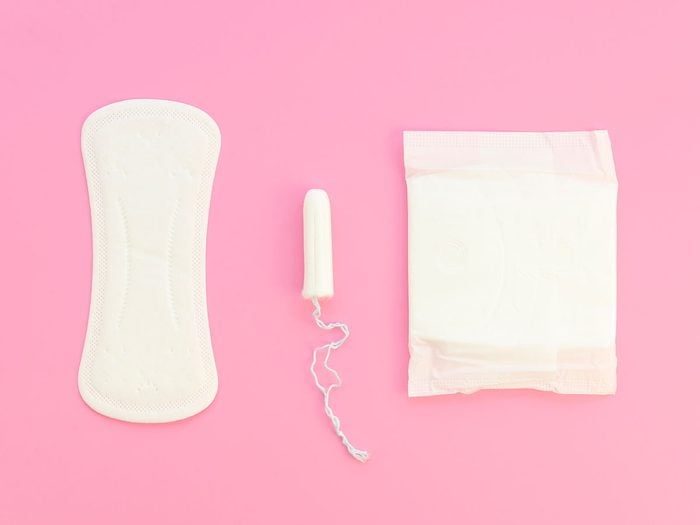
Fighting “Period Poverty” with Free Menstrual Products
Canada | One-quarter of young women in Canada say they can’t afford period products like pads and tampons, and, according to a United Nations report from 2014, one in 10 youth worldwide have missed school because of their menstrual cycle. The Ontario government plans to ease this burden through a new partnership with Shoppers Drug Mart, which will distribute 18 million free pads in washroom dispensers at all public schools in the province over the next three years. The fourth Canadian province to take such an initiative, Ontario’s plan is part of a global movement to end “period poverty,” where stigma and lack of access to menstrual hygiene supplies have negative consequences for education, employment and health, causing absenteeism, anxiety and depression. —By Anna-Kaisa Walker
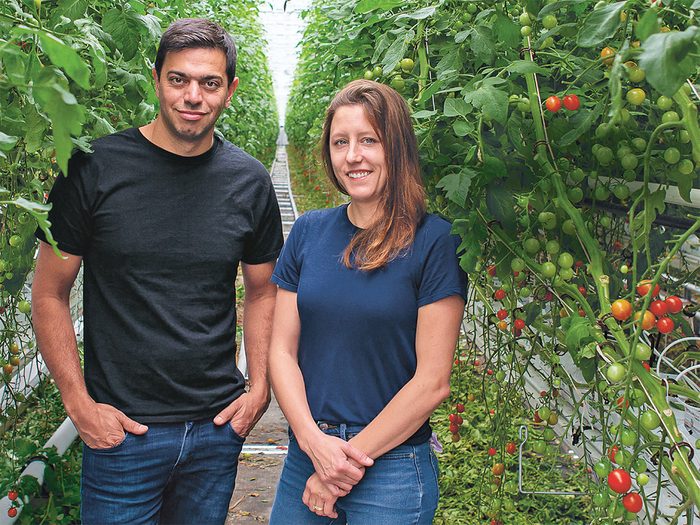
Urban Farming on a Grand Scale
Canada | Imagine a city that grows most of its food on its very own rooftops, where tomatoes ripen on the vine year-round—even in the dead of winter. That’s the idea behind Lufa Farms, which operates four rooftop greenhouses in and around Montreal and delivers more than 25,000 fresh-picked vegetable baskets to its customers every week.
Founded in 2009 by Mohamed Hage and Lauren Rathmell, Lufa sprouted from the idea that urban farming could grow crops where people live, without using any new land, and deliver food without the carbon footprint of long-distance transportation. (In Canada, 92 per cent of imported produce travels more than 1,500 kilometres.) “When you buy a tomato in the winter, you’re probably getting one that’s been trucked in from California or Mexico,” says Rathmell. “We deliver ours right to you the day after they’re picked.”
Hydroponic technology helps Lufa’s greenhouses operate sustainably, recycling about 90 per cent of the water used by the plants. In lieu of pesticides, ladybugs and parasitic wasps devour aphids and other pests. Using residual heat from the buildings below, each farm requires half the energy of greenhouses on the ground. Meanwhile, the company’s programmers keep operations nimble with greenhouse automation. Software manages delivery logistics while allowing customers to tailor their own baskets, choosing from 50 varieties of fruits and vegetables, plus other items, like bread and cheese from local producers.
Lufa Farms is one of many similar urban-farming projects around the world, with commercial greenhouses and gardens springing up in places like London, Paris and New York. Analysts predict city-grown crops could eventually make up 10 per cent of the global food supply. —By Anna-Kaisa Walker

Selling an Olympic Medal to Help a Sick Child
Poland | When Maria Andrejczyk captured the silver in javelin at the 2020 Tokyo Olympic Games, it was a triumph over the odds. Having missed a medal at the 2016 Rio Games with a toss that was just two centimetres short, she overcame shoulder surgery in 2017 and a bone-cancer diagnosis in 2018 to compete again.
So when the 25-year-old Andrejczyk heard about a fundraiser for an eight-month-old boy, Miloszek Malysa, who was born with a serious heart defect, she was inspired to help a fellow Pole beat the odds, too. His family needed US$380,000 for a life-saving operation that would be performed in Barcelona. They had already raised half from their own campaign, and Miloszek was running out of time. “It didn’t take me long to decide,” said Andrejczyk, who chose to auction off her medal for the remaining funds. The winning bid of over US$125,000 came from Polish supermarket chain Zabka, which later told Andrejczyk to keep her medal. —By Anna-Kaisa Walker
Discover all the ways the Olympics changed Canada.
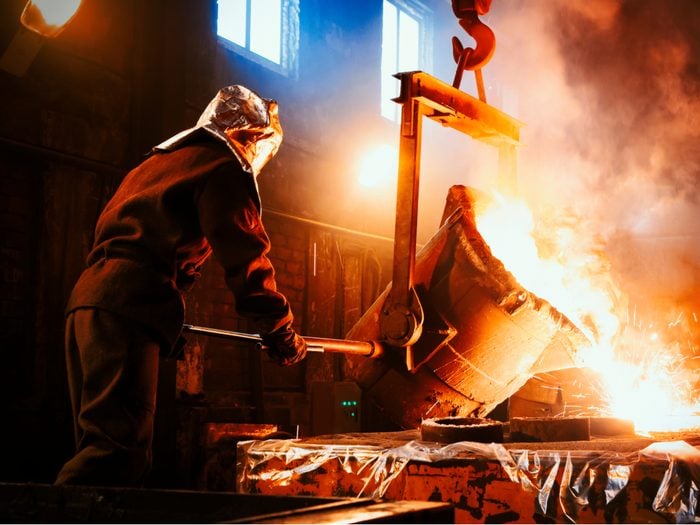
Greening the Steel Industry With Renewable Energy
Sweden | When companies burn coal to produce steel, they spew carbon dioxide into the atmosphere—an estimated seven to nine per cent of all direct emissions from fossil fuels. That’s 2.6 gigatonnes of carbon dioxide—more than the combined mass of all animals on Earth.
But one Swedish steel company has figured out how to make steel without coal. Stockholm’s SSAB recently announced that it has produced the world’s first fossil fuel–free steel, using hydrogen and electricity from renewable energy sources. Automakers Volvo and Mercedes-Benz have signed up for the first deliveries, and SSAB hopes to be able to produce the steel on an industrial scale by 2026. —By Anna-Kaisa Walker
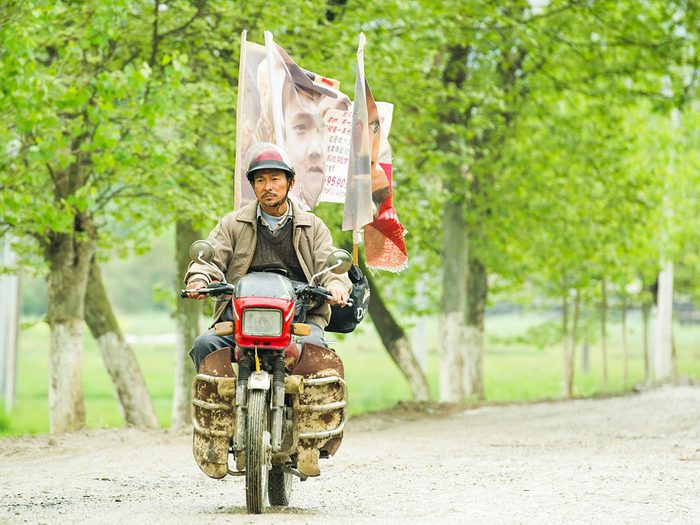
A Family Reunites With Their Kidnapped Son
China | It took more than two decades, 500,000 kilometres, 10 motorcycles and a few broken bones, but Guo Gangtang’s search for his son finally ended last July. Xinzhen disappeared in 1997, at age two.
In China, an estimated 20,000 children are kidnapped every year and often sold into adoption. Guo criss-crossed the country on a motorbike while flying a flag with his son’s picture on it. Once found, police used a photo database and DNA testing to confirm the identity of Guo’s son, now a teacher. A man and a woman were arrested for abduction, having sold Xinzhen to a child-trafficking ring that delivered him to his adoptive parents. —By Anna-Kaisa Walker
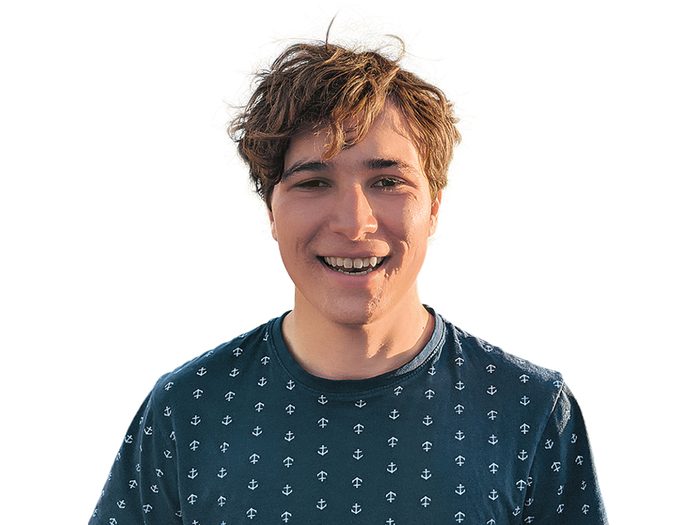
An Innovative Pollution Solution
Ireland | Growing up kayaking around the southwest coast of Ireland, 20-year-old Fionn Ferreira saw the devastating effects of ocean pollution first-hand. Shocked by the amount of plastic littering the shores, he began learning more about the estimated 300 million tonnes of plastic waste humans produce every year. The most dangerous form of plastic, Ferreira discovered, is the kind you can’t see—microplastics, tiny fragments that can end up inside fish and our bodies. We ingest five grams of microplastics every week—about the equivalent of a credit card—from the food we eat and the water we drink. Even more microscopic plastic particles are shed from carpets and synthetic textiles.
After noticing that oil-spill residue on the beach attracted plastic particles, Ferreira set out to design a device that used ferrofluid, a type of magnetic liquid, to remove microplastics from drinking water. In 2019, his prototype—which removed 87 per cent of microplastics from a water sample—won him the grand prize at the Google Science Fair.
Now a chemistry student at the University of Groningen, Ferreira is working with an Ohio-based company to fine-tune his invention for use in homes and potentially in wastewater-treatment plants too. “I love the process of inventing and doing things for the planet,” he says, “and there are many more ideas in the pipeline.” —By Anna-Kaisa Walker
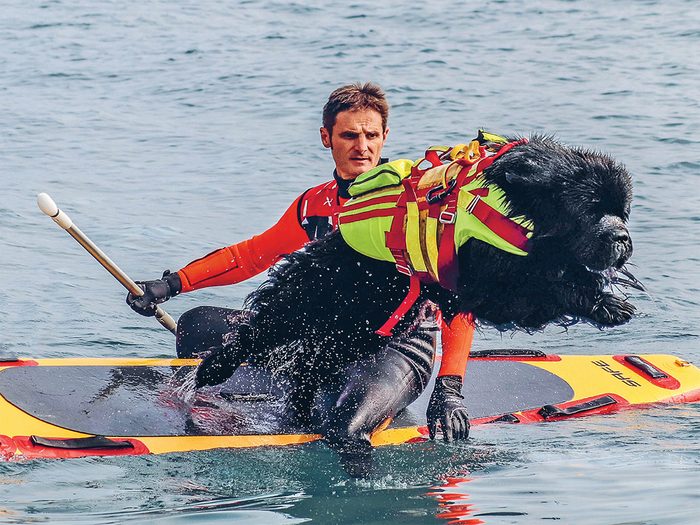
Canine Lifeguards to the Rescue
Italy | Move over PAW Patrol and make way for the Italian School of Water Rescue Dogs. The Milan organization has been patrolling Italian beaches for more than 30 years, with about 400 fully trained and certified “lifedogs”—Newfoundlands, primarily, but also Labrador retrievers and German shepherds—who save about 30 lives a year.
Founder Ferruccio Pilenga, a 61-year-old former photographer and volunteer with Italy’s civil protection service, began operations with his own Newfoundland dog, Mas. Pilenga and Mas saved several lives during the first few years, working closely with the Coast Guard, military and police to rescue sailors, divers and swimmers up and down the Italian coast.
Pilenga uses the “dolphin system,” in which a handler holds onto the dog’s harness as the dog swims out to the person in distress. Over the years, Pilenga incorporated various watercraft and helicopters into his missions, and began to train other canines.
Volunteers can apply with their own pooch, but the training is arduous and takes at least a full year. Dogs are taught how to leap into the water from helicopters and rescue boats, as well as patented survival techniques. Newfoundlands and other water dogs are especially good at this work, Pilenga says, because of their power, water-resistant coats and ability to navigate currents.
“If I intervene alone,” he says of lifesaving, “I am alone. If I intervene with a dog, I’m a rescue team.” Currently working alongside another Newfoundland named Reef, Pilenga has provided demonstrations and education to rescue services in the United States, Germany and Switzerland. —By Jason McBride
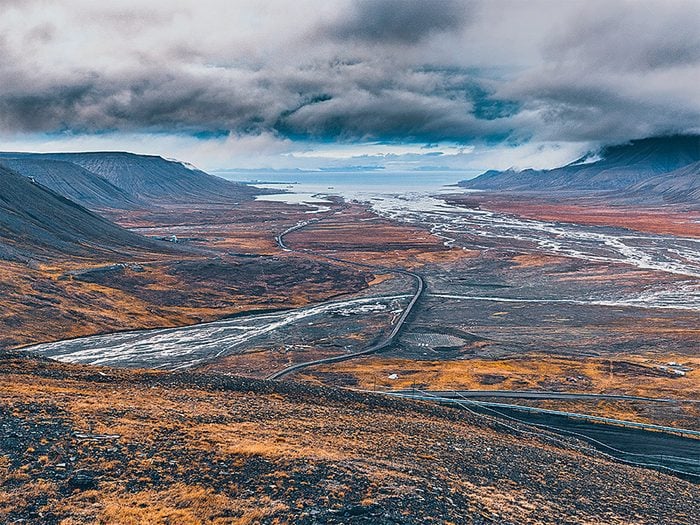
Turning a Coal Mine Into a National Park
Norway | With many countries around the world abandoning fossil fuels for renewable sources, what are countries to do with the now-toxic landscapes left behind? Norway has one very good idea. It’s turning the country’s last Arctic coal mine, located on the Svalbard archipelago between Norway and the North Pole, into a nearly 3,000-square-kilometre natural park. (The decades-old mine ceased operation in 2019.) Svalbard was already of vital ecological importance: 20 million birds nest on the islands during the late summer, while about 3,000 polar bears use its sea ice as prime hunting grounds. Now, the new Van Mijenfjorden National Park—named for one of Svalbard’s largest fjords—will unify this wilderness and, over time, return it to a pristine and well-managed state. —By Jason McBride

The New Home a Community Bought
Canada | In 2018, a Halifax youth worker, 33-year-old Alvero Wiggins, was diagnosed with kidney failure. Unable to work and anxiously awaiting a transplant, the father of four soon had no choice but to move his family into run-down public housing. Sarah MacLaren, one of Wiggins’s co-workers, was appalled by the situation and organized a GoFundMe campaign to help buy him a home. That fundraiser brought in several thousand dollars and also drew the attention of a kind-hearted real estate agent, Brenda MacKenzie, who was waiting on her own kidney transplant. With additional funds raised by lawyers, tradespeople and MacKenzie’s housing charity, the thrilled Wiggins family took possession of a four-bedroom townhouse this past spring. MacLaren referred to it as a “miracle house,” but it was a miracle made possible thanks to guardian angels like herself. —By Jason McBride
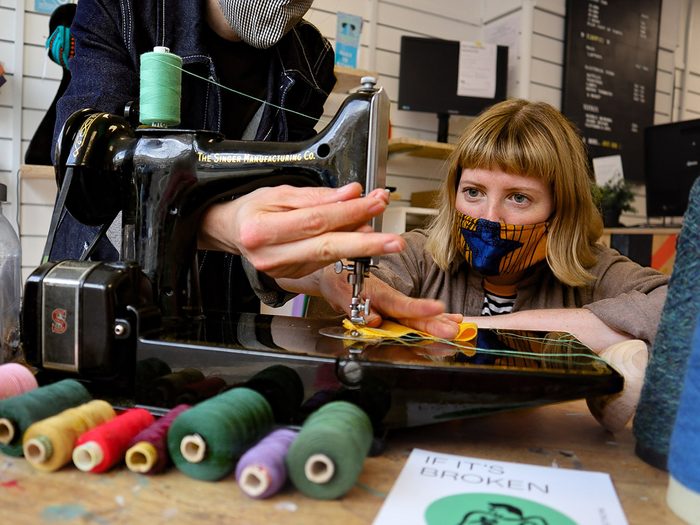
A Simple Solution to Throwaway Culture
Scotland | Fast fashion, same-day shipping and planned obsolescence—nowadays, we expect things to be delivered quickly but don’t expect them to last. The United Kingdom, for example, generated 222 million tonnes of waste in 2018. But a grassroots operation in Glasgow called Remade, founded by former environmental activist Sophie Unwin, aims to alter that thinking. Handy technicians at its three locations help residents mend, repair and reuse everything from laptops to lamps, jeans to jumpers. (The fees are modest—repairing a broken extension cable costs $10 CAD, for instance.) Customers can also buy refurbished computers and other gadgets, or, through workshops, learn how to repair and restore their own items. In a throwaway world, Remade is a keeper. —By Jason McBride
Don’t miss these other proven strategies to save money!
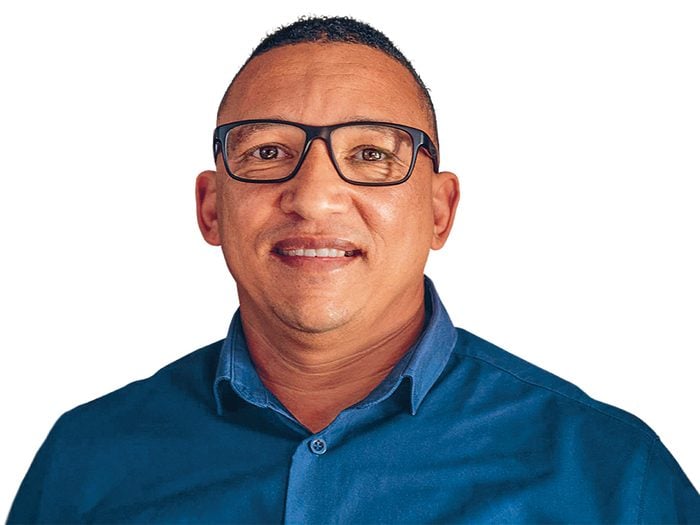
Creating a Safe Haven—with Books
Terence Crowster, a development worker, has long helped disadvantaged youth in the hardscrabble, crime-ridden Cape Town neighbourhood of Scottsville. At various high schools, he helped create, among other things, valuable skill-development, anti-bullying and leadership programs. But it’s the new libraries he’s built out of repurposed shipping containers—with donations and second-hand books solicited through Facebook—that have truly transformed the neighbourhood. The first of these, which opened in 2017, was dubbed the Hot-Spot Library, a reference to both its location at the border of an area fought over by two rival gangs and its aim to be a helpful resource to youth in the area.
Despite the dangerous postal code, the library has flourished, becoming as much a safe space as an academic one. In its first year, its membership grew to 750 young people. Its shelves are now stocked with more than 2,000 books, and educational programming is offered six days a week. Last July, Crowster opened an additional branch in the adjoining Scottsdene neighbourhood, with future branches and libraries-on-wheels planned for elsewhere in Cape Town.
Crowster sees the libraries as part of a larger movement towards social justice in the city: “If this can inspire more people to stand up and do their part, then I have done my job towards changing our community.” —By Jason McBride
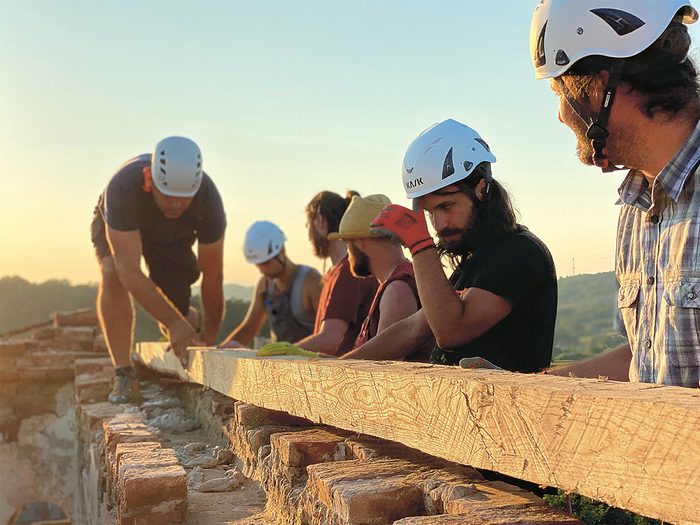
The Team That Races to Save the Past
Romania | The architect Eugen Vaida grew up during a tumultuous time in Romania: after decades of communist dictatorship, a bumpy transition to a free market society left citizens economically desperate. When he was 16 in the mid-’90s, he witnessed fleets of cars, filled with antique furniture, ceramics and traditional costumes, leaving the country to be sold in the West. Outraged at this pillaging of the country’s heritage, he and his brother later began to collect or purchase whatever valuable objects they could find.
Now, Vaida has greatly expanded this mission, turning it into his life’s work. In 2016, he founded the Ambulance for Monuments, starting with a truck, loaded with tools, that roamed Romania repairing neglected historical buildings and monuments with the help of volunteers. Five years later, Vaida has seven trucks, 500 volunteers and has saved 60 structures, including medieval churches, ancient windmills and castles. Various sponsors, including Prince Charles’s educational charity, the Prince’s Foundation, help bankroll the project, but local communities also donate food and housing to volunteers, and their governments (which usually own the structures) supply construction materials.
“It works similarly to an emergency medical intervention,” Vaida says. “There is an ambulance that comes on-site, assesses the damage, stabilizes the patient, and then the patient is ready for treatment.” The end result is heritage rescued from oblivion, but also renewed interest in Romania’s history. Vaida estimates there are still about 600 monuments in Romania that need help, but he would love to see his efforts reproduced in other countries as well. —By Jason McBride
Want to green-up your own routine? Here are 50 things to repurpose instead of tossing in the trash.
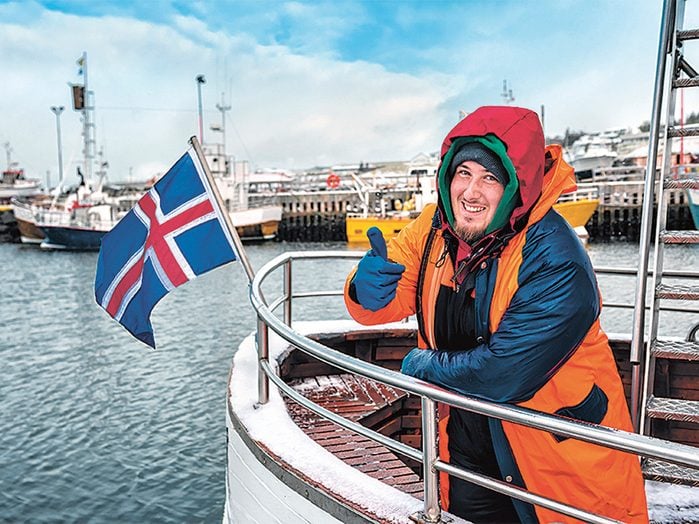
A Simple Solution to the Work Week
Iceland | The pandemic has all but obliterated the idea of work-life balance, so what better time to re-evaluate the work week? Iceland was ahead of the game. In 2015, for four years, 2,500 workers (about one per cent of the country’s work force) reduced their typical 40-hour work week by four or five hours while still receiving the same pay. Researchers found that, unsurprisingly, the workers (drawn from hospitals, preschools and offices) were happier and less stressed. Importantly, they were also just as productive. Nearly 90 per cent of Iceland’s workers now work fewer hours. Similar experiments have been completed in New Zealand and Spain, while politicians in Japan and California have proposed dry runs of their own. —By Jason McBride
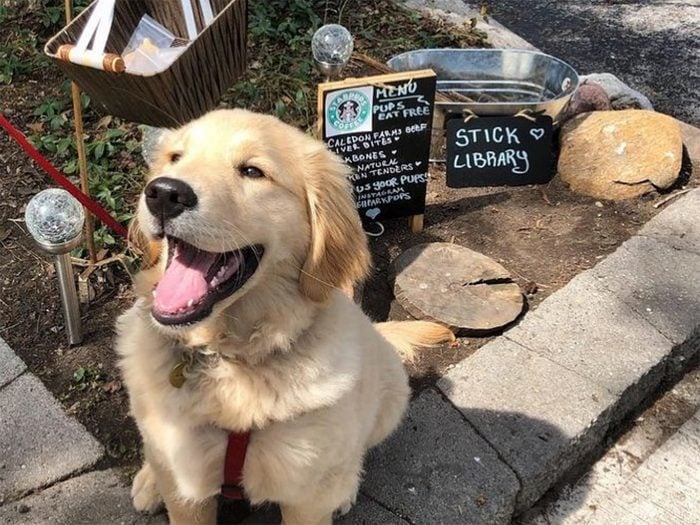
The Dog Café That Brought a Neighbourhood Together
Canada | In this dog-eat-dog world, where’s a weary pooch supposed to go for a break? If you live near Toronto’s High Park, you might stop at the free snack bar for pups that Kaya Kristina set up on her front lawn. Kristina started off small—a few years ago, she began putting out bowls of water for tired, thirsty dogs on their way home after a romp in the park. When the pandemic hit and Kristina was cut off from friends and family, she expanded her front yard’s offerings to include dog biscuits, beef liver bites, dried chicken tenders and even a stick “library.” Now christened StarPups—complete with its own Instagram account, The Pups of High Park—Kristina’s yard has become a popular community hub, as beloved by human residents as canines. —By Jason McBride
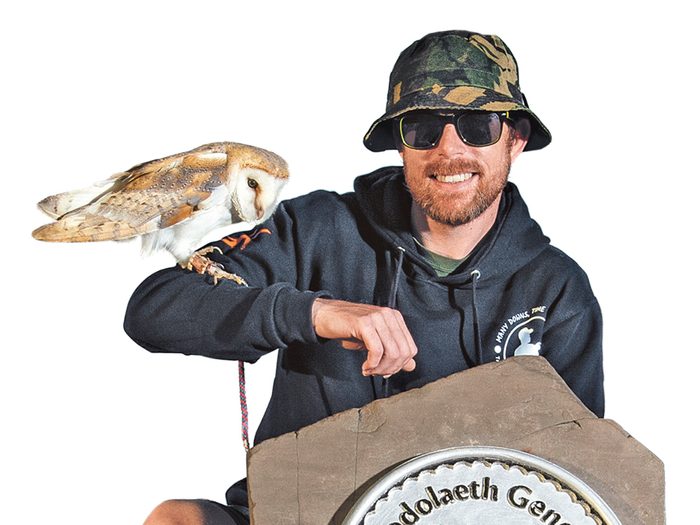
Combating Mental Illness—with Owls
Wales | Jaylo Miles has endured abusive foster homes, several years of homelessness, and drug addiction, all of which left him with complex post-traumatic stress disorder. In the last few years, however, the 39-year-old Cardiff resident has helped himself by helping others, embarking on several charitable and social media initiatives—singing competitions, long-distance bike rides—to raise awareness of mental health and suicide.
He hasn’t done it alone, of course; Miles has a supportive partner, three kids and a pair of British barn owls named Oscar and Louie. Miles rescued the two birds and, over time, they became his unlikely support animals. The two owls, which are brothers, have very different personalities, which Miles has come to see as reflecting his own divided self: the wary Oscar is fiercely protective, while Louie is a calm, loving, “cheeky chappy.” “I firmly believe I didn’t choose the boys,” Miles says. “They chose me.”
Over the years that Miles has had the owls (Oscar is four, Louie two), they’ve become local celebrities in their own right, accompanying Miles on visits to nursing homes and schools, where he gives talks, and even on a hike up Pen y Fan, the highest mountain in southern Britain. “Sometimes just being able to see the owls can bring comfort to somebody’s day,” Miles says. —By Jason McBride
Look out for these signs you could have post-traumatic stress disorder.
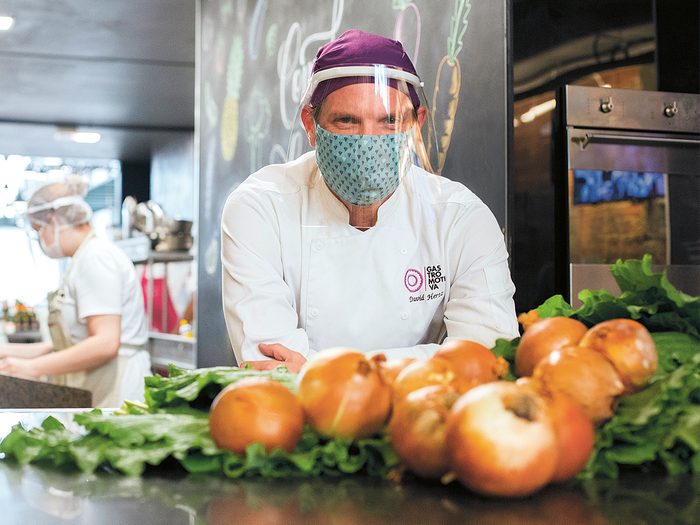
Changing Lives, One Plate at a Time
Brazil | Every bite counts in Brazil’s favelas, sprawling shantytowns on the outskirts of major cities. The country has one of the highest COVID-19 death tolls, and severe unemployment has led to 19 million Brazilians experiencing chronic hunger over the past year.
But for David Hertz, food is more than sustenance. It’s a social-bonding tool, an $8-trillion global industry and, through his non-profit, Gastromotiva, a way to empower the world’s poorest citizens. Gastromotiva provides free courses in restaurant cooking, kitchen-assistant training and food entrepreneurship, all with a focus on nutrition. Students apply online, and after they finish the program, they not only find jobs, but often start their own restaurants and soup kitchens.
What’s more, through 65 grassroots “solidarity kitchens,” many based out of the homes of alumni, as well as partnerships with local homeless charities and food banks, almost 80,000 free meals are distributed to hungry families in Rio de Janeiro every month.
“With Brazil and the world facing all the challenges the pandemic has caused, the greatest reward of my work is seeing people employed and being able to feed themselves,” Hertz says.
A former chef, Hertz was inspired to start Gastromotiva in 2006, after quitting his restaurant job and spending time designing training programs for a São Paulo favela. The non-profit has expanded its courses to Mexico City and Cape Town, and is also working in El Salvador through the UN’s World Food Programme. —By Anna-Kaisa Walker
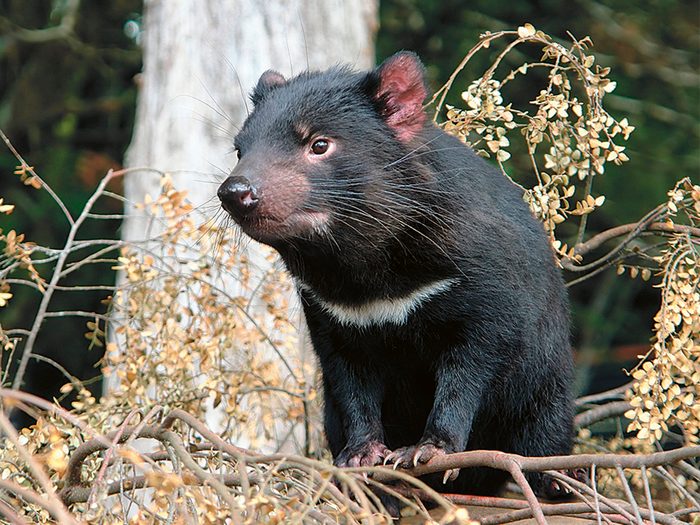
An Unlikely Mammal Returns to the Mainland
Australia | The voracious, whirling Looney Tunes character might be the first Tasmanian devil that springs to mind, but the real-life creature is actually one of the world’s most vulnerable marsupials. Devastated by a facial-tumour disease that wiped out up to 90 per cent of the population in some areas of Tasmania, devils were declared an endangered species in 2008.
Now Tasmanian devils are thriving on the Australian mainland for the first time in 3,000 years, thanks to the efforts of conservation group Aussie Ark. Dozens of devils were introduced to a 400-hectare sanctuary in New South Wales last year, and this spring, the first generation of joeys were born.
Once widespread over the entire continent, prehistoric climate change, combined with hunting by people and dingoes, left Tasmania the only place where devils survived after 1,000 B.C. Aussie Ark hopes to create a self-sustaining population of devils that can help rebalance the ecosystem in the face of invasive species. —By Anna-Kaisa Walker
Check out the cutest baby animals born during the pandemic.
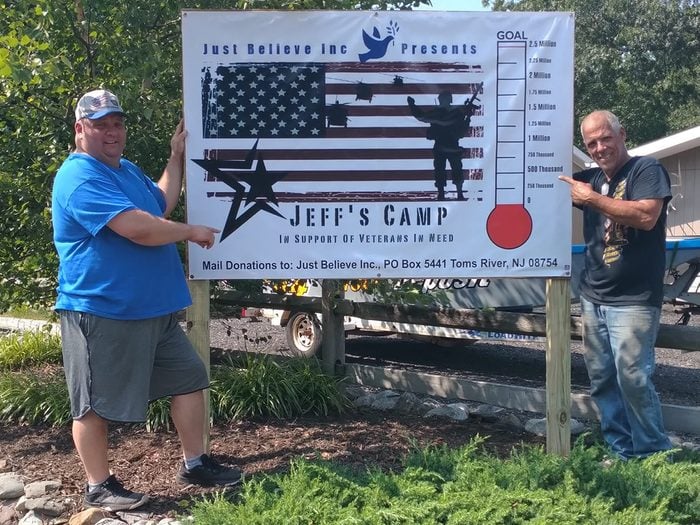
Building a New Sanctuary for Troubled Veterans
United States | Up to 30 per cent of American veterans suffer from post-traumatic stress disorder, while 14 per cent of people who die by suicide in the U.S. every year are vets. Many veterans also struggle with homelessness and addiction.
In June, Marty Weber, himself a vet, donated 15-hectares of New Jersey forest to homeless-outreach organization Just Believe Inc. The land will become a retreat for veterans struggling with addiction, mental illness and homelessness. Weber named it Jeff’s Camp, after Jeff Poissant, his Army buddy-turned-life-partner who died of bladder cancer in 2017.
Weber blames Poissant’s death on an inadequate military health-care system, which didn’t properly treat him until it was too late. For the almost one in four veterans who suffer from mental illness, accessing mental-health care is often difficult and complicated. “Our government is not taking good enough care of our vets,” said Weber. “I have to do what I can in Jeff’s memory to help make things right.” —By Anna-Kaisa Walker
Next, check out 50 inspirational quotes to live by.